AIR PILOT






EDITORIAL STAFF
Editor: Anna Cousins
Contributors: Chris Aikens, Deanna Cain, Anna Cousins, Marcus Diamond, Lachlan Gray, Sophie Isaacs, Joanne Janes, Patrick Larkins, Simon Lutton, Jared Marks, James Mattner, Andrew Molnar, Jason Newell, Naomi Radke and David Stephens.
Airnorth Embraer E170 aircraft at East Kimberley Regional Airport (Kununurra, Western Australia) [Photo Credit: Anna Cousins] AUSTRALIAN FEDERATION OF AIR PILOTS
4/132-136 ALBERT RD SOUTH MELBOURNE VIC 3205 33 MONTPELIER RD BOWEN HILLS QLD 4006 T +61 3 9928 5737 F +61 3 9699 8199
Suggestions,
To discuss editorial contributions, or to make an advertising enquiry, please contact anna@afap.org.au




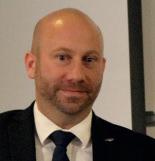











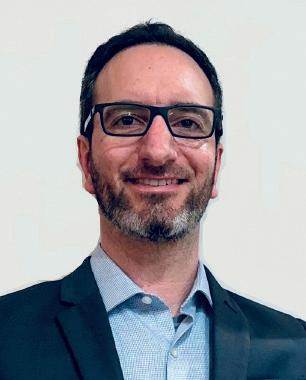


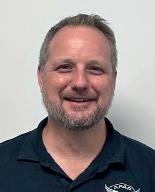


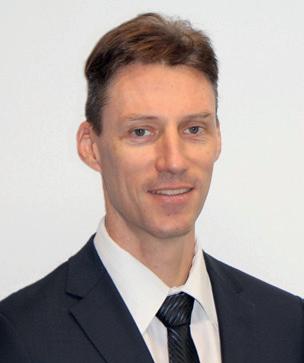

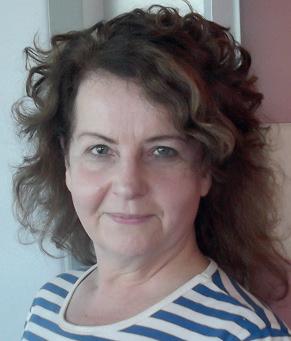
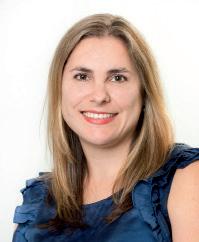


As the newly elected AFAP President, I first want to acknowledge the significant contribution of my predecessor, Captain Louise Pole. Louise commenced as President in 2018 and has overseen a remarkable period of growth and development for the AFAP. She provided a steady hand over the Covid-19 period and leaves the organisation in a very strong position. Louise decided not to re-stand in the 2024 election however I am sure she will stay involved in AFAP affairs.
As the incoming AFAP President I cannot help but think that I am commencing at a pivotal time in aviation in Australia. On the industrial front I was pleased to see the recent negotiation and voting up of the Virgin Australia Pilots' Agreement. This agreement builds on other recent successful negotiations such as those at Sunstate Airlines and Eastern Australia Airlines. We are currently in negotiations at a range of operators across all sectors of the industry.
This includes Qantas Short Haul where a proposed agreement that we did not support was recently voted down and Qantas Long Haul where negotiations have recently commenced. The Qantas policy of insisting on a two-year wage freeze during what has been a recent period of high inflation is never going to make for an easy negotiation. I am however hopeful that one way or another we will find a way through.
The AFAP has also recently been involved in a number of significant legal cases. This includes Network Aviation's Intractable Bargaining Determination (IBD) which was heard before a Full Bench of the Fair Work Commission (FWC) in early October. While our preference should always be to reach a negotiated outcome, I do commend the Network Aviation pilots and our pilot representatives for their commitment and unity over a prolonged period. We await the final outcome of the IBD with interest.
Another legal case of note involves a GA operator, Corporate Air Charter. In this case the AFAP successfully established that under the Air Pilots Award, employers cannot roster excessive standby without this being recognised and accounted for. The case was subsequently appealed by the employer and heard before a Full Court of the Federal Court in November 2024. We also await the outcome of this matter with interest.
On a final note, I was surprised to see that pilot salaries at Express Freighters Australia (EFA) have recently fallen below the minimum salary payable under the Air Pilots Award. The EFA agreement was pushed through under the threat of losing backpay at a time when Qantas Industrial Relations was at its most ruthless coming out of the pandemic. Despite rhetoric from Qantas that it has learnt salient lessons and will be taking a different approach, I was disappointed to see that they would not immediately top up EFA pilot salaries to the Award level. This is being disputed by the AFAP with a hearing in the FWC set for February 2025.
As the incoming President I also look forward to continuing and building on the outstanding work we do on the safety and technical front, in welfare and in other areas. Details of this work are contained within this edition of AIR PILOT.
Wishing you and your families happy holidays.

Captain Ben Bollen AFAP President
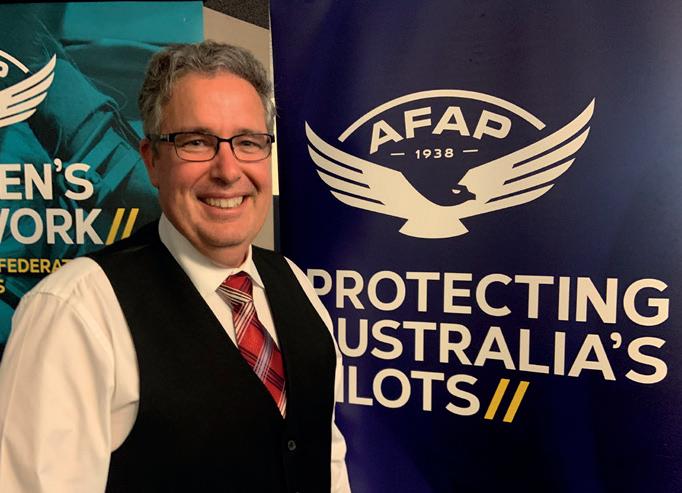
As the most significant event of the year for the AFAP, Convention provides a forum for elected officials to conduct the essential business to meet our regulatory obligations. This gathering also provides an opportunity to plan and discuss the future.
Convention is the AFAP's supreme governing body that meets annually to fulfil duties such as appointing an auditor, voting on proposed alterations to the AFAP Rules and considering ideas and projects of benefit to the membership. Voting members include Council Chairs, Vice-Chairs and Convention Representatives.
Each year for the past 65 years the AFAP has held a general assembly in the form of a day-long Annual Convention, where elected representatives from the various pilot councils come together to discuss AFAP business, share current industry developments and recommend policies to promote flight safety.
This year the 65th Annual Convention took place onat the Gold Coast (Queensland) on Friday 18 October. Following the 2024 Convention, Captain Ben Bollen assumed the position of AFAP President (vacated by Capt Louise Pole). Captain Bollen is an A320 pilot at Jetstar based in Perth.
He has most recently served (since October 2018) as Vice-President (Administration & Finance) with overall responsibility for the AFAP budget and monitoring income, expenditure and financial governance.
Captain Bollen's 25-year aviation career began in General Aviation flying scenic flights, passenger charter, night freight, aerial survey and regular public transport.
In 2004 he moved to Eastern Australia Airlines flying the Dash-8 before starting at Jetstar Airways in 2006. While at Jetstar, he has served as an elected representative on the AFAP Jetstar Pilot Council including as Chair and, earlier, as Vice-Chair.





IFALPA’s Asia Pacific Regional Meeting was hosted over 11-13 November by the Airline Pilots Guild of Sri Lanka.
Newly-elected IFALPA Regional Vice-President (South of Pacific) Capt Louise Pole and AFAP Safety & Technical (S&T) Manager Capt Marcus Diamond joined other pilot representatives, aviation leaders, experts, and professionals who gathered in Colombo for the three days of discussions on aviation safety, policy, and standards in the Asia-Pacific region.
The Day 1 Safety Seminar kicked off with discussions on both Positive Safety Culture and Social Sustainability (following the 59th ICAO Directors General of Civil Aviation Conference, Asia and Pacific Region held in Cebu, Philippines over 14-18 October this year) followed by afternoon presentations from Airbus and AES (Singapore).
On Day 2, the Australian delegates presented on Fatigue Reporting and shared their fatigue reporting forms and recent experience.
Day 3 focused on updates from Member Associations across the entire region (including from Australia, Bangladesh, India, Pakistan, Singapore, Sri Lanka and Thailand).

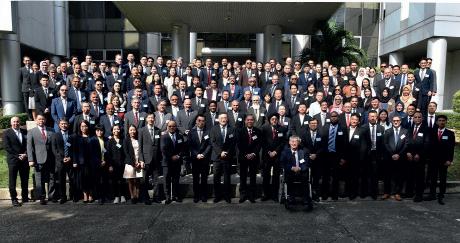
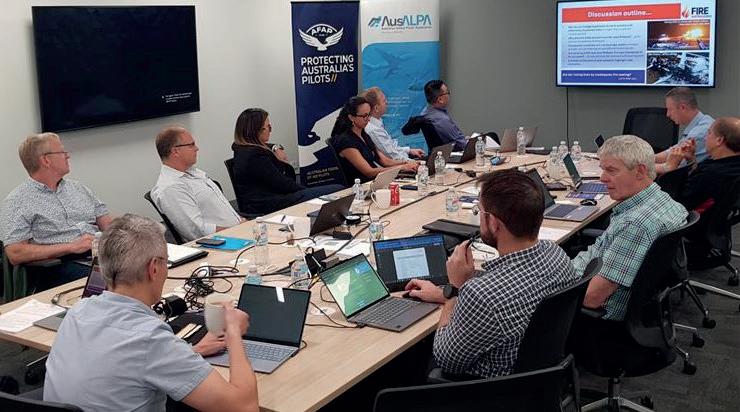
Chaired by Capt Timo Lempiäinen (Finnish Pilots' Association), the 2024 Dangerous Goods (DG) Committee meeting took place over 1-3 October at the AFAP’s Brisbane office. This first ever IFALPA DG meeting in Australia gathered 20 aviation experts, including from the Civil Aviation Safety Authority, Fire Protection Association Australia and Virgin Australia.
The work focused on the drafting of IFALPA positions related to the safe transport of DG by air that will cover:
• Mitigation of fire risks of electrically powered vehicles and equipment airside.
• Flight deck lithium (Li) battery thermal runaway events and the overall risk this poses to flight safety if insufficiently addressed through risk assessment and mitigation; and
• Energy content of Li batteries in air cargo ICAO Annex 18 (DGs Annex) which dates from 1989 and is long overdue for an update.
Detailed presentations from the Director of the Thermal Runaway Incident Program (TRIP) and from Australia's Fire Protection Association were followed by a fruitful exchange on accident prevention and fire risk mitigation.
Capt Marcus Diamond attended ICAO's 35th Asia Pacific Air Navigation Planning & Implementation Regional Group meeting in Bangkok over 25-27 November.
The group reviewed the status of deficiencies included in the Asia Pacific list of deficiencies in the air navigation fields - including (i) operations in Australian Traffic Information Broadcasts by Aircraft (TIBA) airspace and (ii) the ongoing operation of firefighting under the ICAO Remission Factor - and proposed actions with target dates for remedial measures. These have been listed by ICAO as "infrastructure constraints".
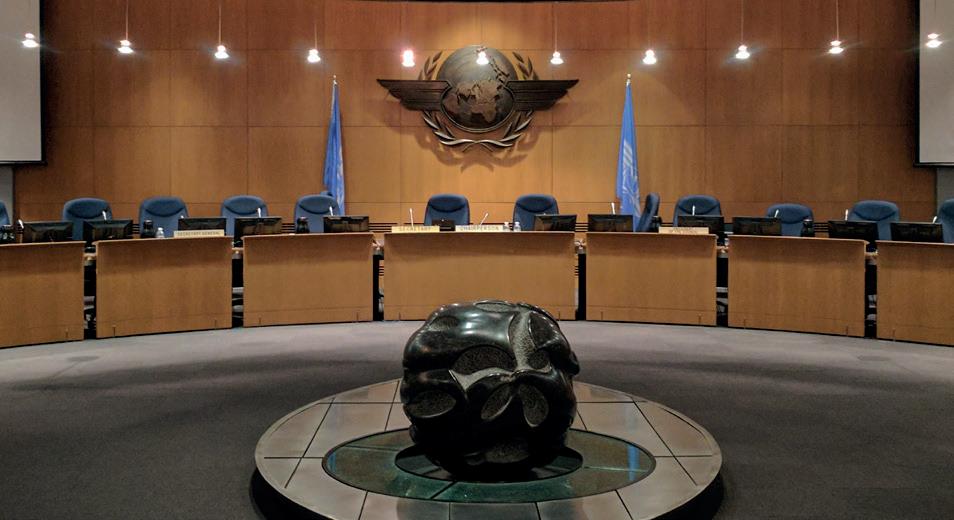
By Captain Matthew Nielsen (HPC Committee Chair)
Every AFAP member is aware of the industrial activities of the Federation via enterprise bargaining, pilot representatives and occasionally those unlucky enough to find themselves seriously at odds with their employers. Industrial work is high energy and high profile and even occasionally results in our very own AFAP Executive Director making the evening news.
However, Safety and Technical (S&T) work is arguably the eldest child of the Federation. The AFAP was, after all, a founding member of the International Federation of Airline Pilot Associations (IFALPA), a champion of safety and technical activities and one of the few nonstate bodies granted status within ICAO.
I found myself reading an advisory circular the other day during a quiet moment. The matters discussed were helicopter specific, but it set me thinking.
The more I read, the more I recognised much of the material and its genesis in a job card set by ICAO for the purposes of modernising and elaborating Annex 6 Part III of the ICAO Standards and Recommended Practices.
I appreciate that this seems unbearably dry on superficial examination, but it reminded me that it is human nature to miscalculate the consequences of our actions for good and bad at times.
It set me to thinking about a series of meetings that I first attended in 2018 across Cologne, Vienna, dozens of online meetings and, more recently, Montreal.
One of the results of this long effort across time and pandemics was an ICAO document – 'The Helicopter Code of Performance Development Manual' (Doc. 10110).
So here I was with my CASA Advisory Circular, reading references to Doc.10110 and recognising the results of what was years of arguments, occasional walkouts, robust discussion and a shared motivation to illuminate areas of regulatory guidance at a global level that will have meaningful effects on safety outcomes for helicopter pilots worldwide.
Additionally, IFALPA and ICAO co-authored a Helicopter FRMS Guidance Manual for Regulators and are working on the Helicopter All Weather Operations Manual.
This will address specific capability differences in rotary aviation with enroute PBN authorisations and helicopter specific instrument approach design.
We are currently finalising work on a proper definition of what will be codified in global regulations as Technical Crew Members. There is more in the pipeline!
Change in a mature and highly regulated system is necessarily slow and methodical. Small glimpses of words or intent that you might recognise as your own, coming back in the form of local regulatory change, is evidence of the fact that real change, whilst requiring patience, is absolutely possible. I can also tell you that it is somewhat satisfying to think that even at such a small scale of input, individuals and small groups can have meaningful input to actual change.
We must all continue to support and recognise the important work done by our industrial staff. Take a minute to consider though, the varied work of the AFAP, AusALPA, IFALPA and ICAO across portfolios as varied as helicopter, accident analysis, air traffic services, human performance, security and aerodromes.
Consider that areas of interest to you might benefit greatly from your support and input. You might well be the expert an area needs to progress a development initiative and thereby improve in some small way the highest possible standards of safety and technical outcomes for us all.
I would encourage those of you interested, to reach out to your pilot reps and contact the AFAP's S&T team (technical@afap.org.au) to work out where we could best align your interests with ongoing S&T work.
I have had the good fortune to meet some amazing pilots, engineers and crew from countries and cultures all over the world. I have seen a vast range of places and shared friendship with some amazing humans and it has made my piloting career that much richer.

Captain Mattew Nielsen is the Chair of the AFAP Helicopters PIlot Council and a Director of the Australian Air Pilots Mutual Benefit Fund. At the international level, he also chairs IFALPA's Helicopter Committee that represents rotary pilots at ICAO to provide input on proposed provisions related to Helicopter operations.
Capt Nielsen operates as an Air Ambulance pilot on the AW139, based in Victoria. He has conducted flight training, utility, marine pilot transfer, offshore supports, SAR and HEMS operations throughout the Asia Pacific, Africa and the Middle East.

Rotary aviation is traditionally counter cyclical to airline activity. Normally, high resource prices dampen demand for travel but light a fire under helicopter support companies. That nexus is broken.
Training pipelines have reduced to a trickle, the Australian Defence Force doesn’t generate pilots with the depth of experience required for high end air transport work.
The ability to build capacity and experience amongst the newer pilot cohort has effectively been destroyed by regulatory change and the enormous cost of becoming a ‘job ready’ helicopter pilot means that people make sensible investment decisions and choose other careers.
This is not a uniquely Australian phenomena. New largescale operations in the Middle East, Africa and Asia are hungry for experienced pilots and the volume of pilots taking opportunities in the US and Canada has increased.
Rotary pilots are now also the target of E3 visa approved operators dangling licence conversions, reasonable salaries and generous sign on bonuses for Australian pilots.
The absolute numbers that take up any of these roles is of course small, but in such a specialised and relatively small group, it is nonetheless relevant and adds additional pressure to the situation.
Sadly, this has yet to translate into a meaningful change in the old adversarial employment relationship. As you see from the industrial report to follow, there remains far too many instances of unreasonable behaviour from certain organisations. It needn’t be this way. There are great recent examples of employers taking initiatives with more collegial approaches to the employment relationship.
To make matters even more dynamic, the pace of technological change has only accelerated. ‘Legacy’ aviation faces a new range of challenges from advanced aerial mobility, air traffic service pressures, spectrum and airspace congestion, electrification, and environmental considerations.
It is more critical than ever that we cooperate to ensure that pilots are represented in the discussions around how these issues are managed. The AFAP, AusALPA and our IFALPA efforts remain our best avenues to influence regulatory change.
The traditional time scales of sensible and measured regulatory change are under unprecedented pressure from aviation disruptors. They want access to our safety reputation, airspace and social licence all without having to live ‘within’ the legacy regulatory framework. If we aren’t at the forefront of the discussion, ‘at the table’ if you like… we may find ourselves on the menu.
Now more than ever, the Federation has a critical role in smoothing out some of these tension points when things break down in the workplace and to organise our efforts from a safety and technical point of view.
I encourage you all to consider just how well the AFAP has served the interests of our industry and to inspire your colleagues to join, get involved and protect the profession.
The ongoing annual leave and casual underpayment disputes involving PHI (formerly HNZ) continue before FWC. Unfortunately, the prospect of settling all matters in dispute dissipated despite the AFAP’s effort to progress various compromises.
A related issue between the parties has been the right for PHI to be legally represented. The AFAP won that case in the first instance which at that moment meant that PHI could not be represented by lawyers in any dispute arising under the EA, although the vehicle for that case was the Karratha EA, but with similar terms in other PHI EAs.
Unsurprisingly, the company appealed that decision and unfortunately it was overturned on appeal by a Full Bench. However, the AFAP has a number of concerns about that appeal decision, including the paucity of reasoning and, indeed, the reasoning itself.
So much so the AFAP is seeking a Judicial Review of the decision before the Federal Court. That will no doubt be heard and decided in the new year.
This is a very significant case that will set a precedent for the federal industrial relations system. Ironically, this issue arose from spurious arguments made by PHI about the constraints of the EA, which the AFAP argued would also constrain PHI’s legal representation.
On a more positive note, the Kimberely EA negotiations have taken a positive step since the AFAP’s NO campaign on the company’s first attempt. In summary, since the NO vote, the AFAP has won full back pay for members, the reinstatement of the 15/13 roster, the right to take annual leave rather than have it merely cashed out every 21 days and the reinstatement of the scope of matters that a pilot may raise a dispute over to include any workplace matter (as opposed to an interpretation of the agreement only).
On the basis of these substantial improvements the AFAP endorsed a YES vote and the ballot was commensurately overwhelmingly successful.
The company’s application to the FWC to approve the Agreement was rejected by the FWC singularly because the Agreement did not comply with the Fair Work Act, and the company refused to give an Undertaking that it will comply with the Act, which if it had given that undertaking the Agreement would have been approved.
Added to this were several errors in the company’s application and concerns also raised by the FWC about the better off overall (BOOT) test. It is now up to the company to fix this situation. The FWC told them how and that involved nothing more than providing the Undertaking required by the FWC, to the FWC.
Meanwhile, we can report positive news at OSA, Babcock Onshore, LifeFlight and Auriga. The proposed OSA agreement, which mirrors the CHC offshore Agreement, has been overwhelmingly adopted by the pilot body, and has now been approved by the FWC, as has the CHC Offshore Agreement.
What until recently have been amicable and positive negotiations involving CHC Onshore have turned sour. At the last meeting the company advised of its intention to end negotiations and instead finalise a proposed agreement to put to vote - although unagreed - not dissimilar to PHI.
Refusing to resume negotiations and instead put an unagreed document to a vote way back in September and never did, has now forced the company to concede that the AFAP has been trying to reach agreement and could not oppose an application by the AFAP to the FWC for a protected industrial action ballot. That application was approved with voting underway.
A further matter involving CHC offshore is on the cusp of resolving. Since 2013 the respective EAs have provided for an overtime payment where the pilot flies more than four hours.
When pilots started to claim this entitlement the company, as is its fall back these days, tried to argue it was a mistake – 11 years after that first EA. The company refused to pay, and the matter was referred to the FWC.
A negotiated settlement has now been reached which will see AFAP members who submit a claim paid on a pro-rata basis against the total settlement sum. The claim was run on behalf of CHC Offshore AFAP members by the Pilot Group Reps, again through the AFAP. The first stage of the settlement payments is due in December.
What were thought to be positive developments in the LifeFlight negotiations following an unsuccessful company ballot, a successful protected action ballot application and several conciliation conferences before the FWC, an agreement was finally reached with the assistance of the Commission.
However, it all fell apart at the drafting phase when the company reneged on the major elements of the package. Try as we did to restore the integrity of the conciliated agreement, the company pressed ahead and put the UNAGREED document out to vote. The AFAP and pilot reps did not support the document and unsurprisingly it was voted down by a majority of pilots.
However, with the further intervention of Commissioner Riordan who met with the company, the Board eventually agreed to reinstate the “reneged” conditions. He then met with the pilot group to report that development and encouraged the parties to confirm agreement on those terms being reinstated.
That happened, and with the support of the AFAP for the agreement, it was put to ballot and overwhelmingly endorsed by the pilots. The agreement is presently with the FWC going through the approval process.
The annual leave dispute will be heard before Deputy President O’Keefe on 2-8 April in Perth. The AFAP and pilot reps supported the EA making it almost certain to be adopted. It was by an overwhelming majority. This is a particularly satisfying outcome given it is one of the first, if not the first, Majority Support Determinations run by the AFAP.

As a pilot in Australia, understanding your obligations regarding drug and alcohol management is crucial for both your career and aviation safety.
This article provides an overview about CASA's drug and alcohol testing regime, your responsibilities, together with the legal framework that supports these matters.
Australia's aviation drug and alcohol management regime is principally governed by Part 99 of the Civil Aviation Safety Regulations 1998 (Cth).
Part 99 was developed and implemented following a tragic accident in 2002, in which a single engine Piper Cherokee 6, with 6 people on board crashed and caught fire shortly after take-off from Hamilton Island. All occupants, including the pilot, were fatally injured.
The toxicology tests showed that the pilot had used cannabis previously, consumed alcohol the night before, taken panadeine, and had less than 7 hours sleep.
Although there was insufficient evidence to link these factors to the accident, the possible adverse effects of these matters on pilot performance could not be discounted.
This unfortunate event led to the Australian Transport Safety Bureau making recommendations, which in turn led to Part 99. Part 99 constitutes a comprehensive framework and represents a significant development in Australian aviation safety regulation, establishing both proactive and reactive measures for managing substance-related risks in aviation.
Put simply, the fundamental rule is simple: you cannot perform any safety-sensitive aviation activity while under the influence of alcohol or drugs.
Part 99 – the
Part 99 establishes two distinct but complementary testing regimes:
• first, CASA's direct testing authority; and
• second, organisation-based testing under Drug and Alcohol Management Plans (DAMP).
All pilots performing safety-sensitive aviation activities (SSAAs) must comply with Part 99.
SSAAs are defined broadly to encompass operational roles including, but not limited to, flight crew, maintenance personnel, and ground handling staff operating in aerodrome testing areas.
CASA can conduct random testing at any aerodrome. Additionally if you work for an organisation with a DAMP, you may be tested:
• when starting a new SSAA role;
• if a supervisor suspects you're affected by drugs or alcohol;
• after an accident or serious incident; and
• when returning to work after a previous positive test.
CASA's direct testing authority enables random testing for alcohol (governed by specific measurement parameters), opiates, cannabinoids, cocaine and amphetamines.
The testing protocol follows strict procedural requirements. For alcohol, testing is done via breath analysis. If your first test is positive, you'll receive a second test.
Drug testing uses oral fluid samples. A positive initial test leads to a second test, and if that's also positive, the sample goes to an approved laboratory for confirmation. During these processes, you must cease all safetysensitive activities.
Organisations with a DAMP must ensure compliance with three core components: education programs, testing programs and response programs. They will differ in the detail between organisations.
Although processes under a DAMP will depend on the particular organisation’s requirements, they are no less important to follow than CASA’s direct testing process.
Under either regime, you should follow instructions, and not leave the testing area until you are clearly told that you can do so. Ask if in doubt. Any procedural irregularities can be raised at a later date.
Although you can technically refuse to be tested, that refusal can have serious consequences. While CASA cannot physically force you to take a test, a test refusal can lead to prosecution and also requires you to stop performing SSAAs immediately.
There are rights of review. Pilots can seek medical review of positive results and there are appeal mechanisms within CASA and the Administrative Appeals Tribunal.
Further, privacy protections exist both within aviation and the general law. These rights of review can be complex procedures and are therefore beyond the scope of this article.
Pilots should seek assistance from the AFAP in the event these safeguards need to be exercised.
If you do test positive the focus should always be on, firstly, identifying and addressing any underlying medical issues, and then getting back to flying as soon as possible. How you achieve this depends on the individual circumstances.
At the very least, you will be required to undergo a comprehensive assessment by a Fellow of the Australasian Chapter of Addiction Medicine (FAChAM) specialist or an addiction Psychiatrist to confirm whether you are suffering from a substance dependency disorder. Depending on this assessment, a period of rehabilitation, ongoing surveillance and abstinence may be required prior to returning to flying.
In all cases, you will require clearance from a MRO and treating clinician and be able to demonstrate to CASA that you meet the applicable medical standards, and are not a risk to the safety of air navigation.
The best approach is to be proactive about drug and alcohol management. Pilots should be aware of their alcohol intake and the status of any medications (it is always prudent to check with your DAME or CASA).
Most importantly, if you think you might have a problem, seek help before it affects your flying career. The AFAP can help you access the resources that will let you continue flying.
Remember, CASA's primary goal isn't to catch pilots out - it's to ensure aviation safety. The testing regime exists to protect both you and the public.
By understanding and following these requirements, you're not just meeting your legal obligations, you are contributing to the safety culture that makes Australian aviation one of the safest in the world.
The Human Intervention Motivation Study (HIMS) is a drug and alcohol prevention and rehabilitation program for pilots, designed to remove the stigma associated with addiction while providing a pathway to recovery.
This program was pioneered by the US Air Line Pilots Association in the 1970s, and has been adopted by others pilot unions, including the AFAP and NZALPA.
The AFAP is a long-term supporter of HIMS and advocates for the implementation of an industry wide HIMS program across the Australian commercial aviation sector.
Alcohol and drug dependency is likely to jeopardise your health, relationships and career. HIMS provides a pathway to access rehabilitation and post rehab support and monitoring, with the ultimate aim of returning pilots to flying.
What sets the HIMS program apart from standard medical treatment of drug and alcohol cases is a tripartite approach.
That is, the initiative is overseen by a combination of management, pilot unions (through peer monitors) and the regulator.
Essential to the success of this is trust between all stakeholders that the aims of the program will be met:
• Operators must have confidence that public perception of their brand will not be undermined;
• The regulator needs to ensure the HIMS program remains compliant with safety regulations; and
• The AFAP requires that individual pilots are dealt with fairly as they undergo treatment and work through the HIMS pathway, leading to a return to flying.
All three stakeholders see flight safety as an overarching priority.
Contact welfare@afap.org.au for more information or visit www.aushims.org.au for case studies and details of available resources.


AFAP Women’s Network members attending this year's Annual General Meeting (AGM) on 1 August at the AFAP's Brisbane office enjoyed meeting and hearing from our guest speaker – the RAAF's Director of Women, Peace and Security Studies Dr Dee Gibbon - who presented on the topic 'Increasing Women's Representation in Piloting: Lessons from the Royal Australian Air Force'.
The Australian Defence Force (ADF) lifted the combat exclusion for women more than ten years ago. However, some roles in the ADF, such as pilots and aircraft technicians, still have low numbers of women despite efforts to create a gender-inclusive workplace.
Dr Gibbon spoke about her research that examined factors impacting women’s selection of a flying career and identified the gender-based barriers and challenges women pilots face through different career stages.
She also described successful strategies designed to help increase women’s representation in non-traditional fields like piloting at the RAAF. ‘Tech Camps’ provide young women considering an Air Force career in aviation technical and engineering trades the opportunity to briefly experience first-hand the reality of these roles. The RAAF also implemented a Graduate Pilot Scheme to encourage women already pursuing careers as civilian pilots (studying Aviation at a civilian university) to consider pursuing careers as Air Force pilots.
These projects focus on recruitment, but also support, retention and progression of women pilots, air combat officers, technicians, engineers and ground defence roles.
NEXT MEETING: Brisbane, March 2025

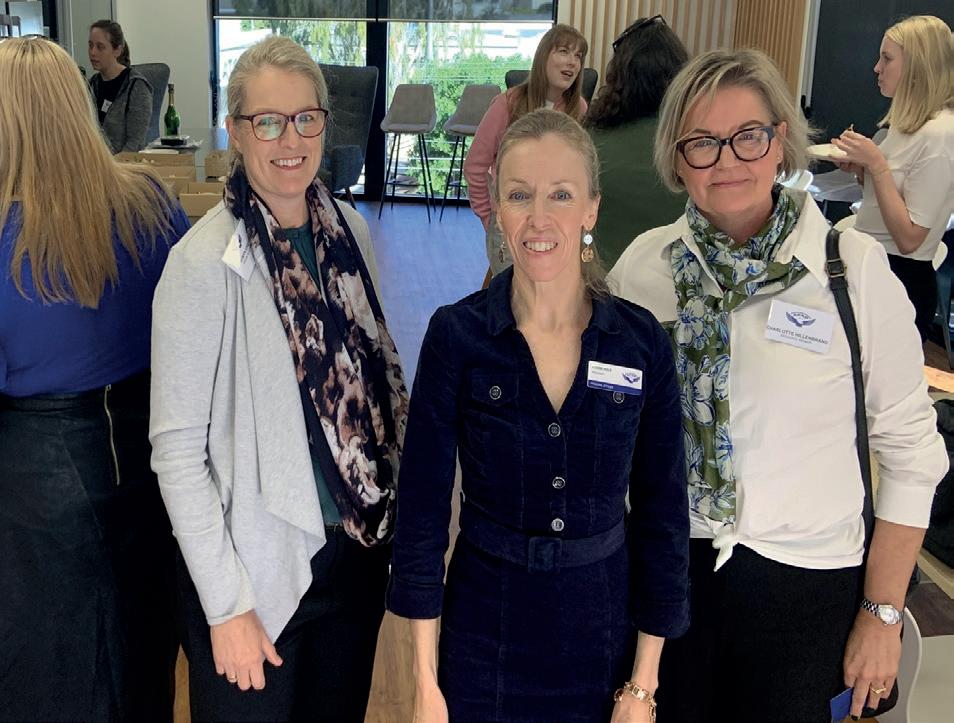
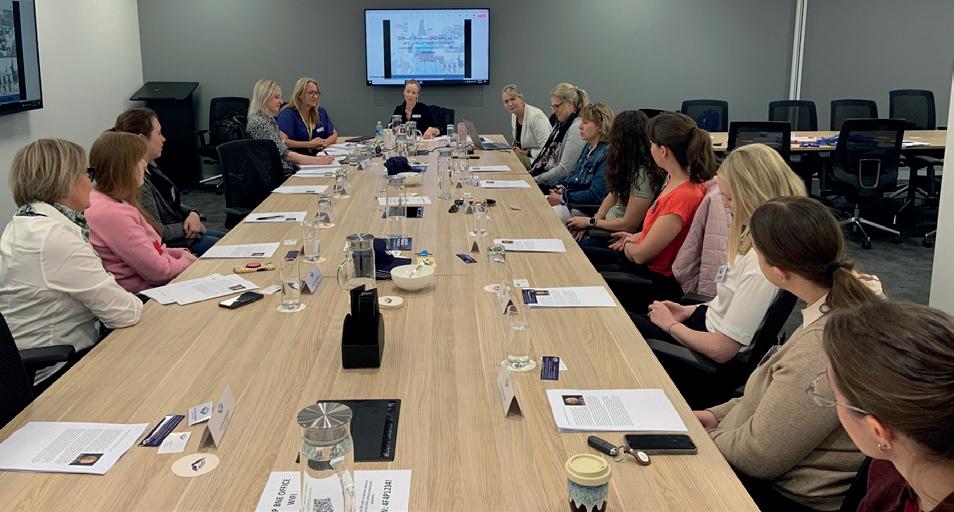
IFALPA Female Pilots Working Group (FPWG) Chair Capt Maria de Mar Alguacil, and other FPWG members met in Singapore over 19-20 November.
Australia has been involved since the FPWG formed in 2019 and was represented in person this year by Capt Cathy Brown from the AFAP Qantas Pilot Council. Representatives from Korea, Indonesia and Taiwan also attended for the first time in person this year.
In her opening speech, Singaporean Senior Minister of State Dr Amy Khor Lean Suan acknowledged that the FPWG “has successfully implemented a range of policies aimed at improving workplace inclusivity ...that help to create a working environment where female pilots feel supported in their careers. It allows the aviation workforce to be more welcoming, inclusive, diverse, and resilient overall.”

One key aspect of the new enterprise agreement (EA) is the intention of the company to move towards a pilot establishment that would enable the provision of 10 days off per roster period (as opposed to the current 9 days plus one buy back).
Current low pilot numbers in Sunstate are negatively impacting factors like late finishes, call-ins on days off and equitable workload distribution. Also what has been problematic is the lack of access to ad hoc leave. All these factors will need to be built into appropriate establishment numbers to achieve the 10 days off by the end of the current agreement (December 2026).
The Company has been put on notice to provide actual figures at each SPC meeting as to how close they are to achieving establishment numbers that would enable 10 days off per roster, while still ensuring the issues detailed above are addressed as well.
The transition to the 400 operation mostly affects the Adelaide base while the impact on training has resulted in new arrivals to the operation effectively being placed on hold until the middle of 2025, whilst conversion training (predominantly impacting Eastern) is completed. Thankfully the end result of the fleet movements will be all Sunstate pilots on the higher salary table which will also assist during the next EA.
The Committee is currently working with the company regarding the implementation of the Jeppesen roster build. Initial results are encouraging although further comparison work is being undertaken by the Committee to ensure both EA compliance and ensuring successful requests are at least maintained at current levels or ideally improved. It is expected that comparative studies will continue through the first quarter of 2025.
Work remains ongoing to ensure that any changes to the Flight Operations Quality Assurance (FOQA) deed are done on a fully collaborative basis. Initial desire to see the formal introduction of the app has become somewhat more muted from the company, although the desire of the Council is to ensure ongoing protection of data through the renegotiation of the FOQA deed.
The previously agreed sign-on times relating to operating from a non-flight planning base, or where paxing has occurred into a non-flight planning base has recently been causing issues as scheduling has been seemingly disregarding previously agreed timeframes.
The SPC Committee has recently written to Sunstate management detailing our understanding of all the various sign-on times.
Dependent on when the company responds, the SPC Committee will then be seeking to advise members of the agreed timeframes and ensuring that where the appropriate times are not provided that crews ensure flights are delayed to enable safe crew flight planning.
AFAP membership density at the Sunstate operation remains high at over 90%.
The full council now consists of Capt Jarrod Blaker (Chair), Capt Anthony Berko (Vice Chair), Capt Richard Copland (Acting Sec), Capt Dan Lyons, Capt Louise Pole, Capt Bianca Salim, Capt Russell Thompson and sees the return of AFAP Life Member Capt Rod Millroy.



While the recent nomination process left two vacancies on the Eastern Pilot Council (EPC), the Committee is confident that interested and active members will be keen to nominate, to ensure the valuable work of the Council continues into the future.
There has been a slight rejigging of positions with Capt Ben Moss moving into the Chair, supported by Capt Nathan Hayes as Vice Chair. Capt Tim Anderson continues as Secretary supported by Capt Maddie Bartlett, Capt Shabbir Parekh and Capt Brendan Quaife.
The EPC also approved the following roles of Rostering, Accommodation & Transport (Capt Nathan Hayes), Meals & Recruitment (Capt Maddie Bartlett), Safety & Technical (Capt Tim Anderson), Welfare (Capt Brendan Quaife & Capt Shabbir Parekh) and the EBA (Capt Ben Moss).
One focus of the new EPC is to prepare for the onset of new hires entering the company once the conversion training onto the all 400 fleet is completed in mid-2025. EPC members will engage with new hires to explain the benefits of AFAP membership.
While the EA continues to work well the area causing most confusion relates to the 10 days off and the interaction with annual leave, part-time and sick leave.
The issues are slowly being worked through and much of the confusion arises from administrative arrangements with the company working through the issue of matching up days and hours.
Also, the EPC will be closely watching the efforts of the company to meet the establishment levels to ensure 10 days off (rather than a buy back scheme) is achieved by the end of the agreement.
This has been impacted with a virtual freeze on recruitment while the company transitions to the new fleet with the training requirements focussing on the transition rather than new hires.
Side Letters to the previous agreement that also require updating to the new EA are also to be reviewed by the company with the company confirming that sim and paxing on the same day will not occur (this had been threatened) and breakfast meal variation will potentially continue after a survey of members.

The recent move from the company towards an all 400 fleet has resulted in significant training impacting new arrivals into the company (see above).
A handful of senior 300 captains are clearly using the change to transition to retirement although the company confirmed that some form of 200/300 flying will continue until mid to late 2025.
They also confirmed that those 300 captains who may not have seniority to achieve a 400 command (and subsequently have not bid during Expressions-ofInterest) will probably not be adversely impacted as the mid to late 2025 timeframe will probably open up vacancies for that cohort as well.
The Committee is still exploring the issue of out of seniority movements in relation to training captains and the potential for bypass pay to be applicable to those impacted.
While the new rostering system works well (in that the success rate of bids has increased) there are still issues to resolve around the weighting of certain bid preferences which at times leads to unexpected results in relation to either clumped days off or single days off.

The first Network Aviation Pilot Council (NAPC) Committee meeting was held on 2 December in Perth where a full day meeting addressed many long standing issues causing the pilot group frustration.
These matters were raised with the company and although some will only be clarified with the impending Arbitration decision, there was a seeming desire from all around the table to try and constructively look into the concerns raised by the NAPC.
The Intractable Bargaining Determination (IBD) hearing took place at the Fair Work Commission in Perth during the first week of October, with the AFAP tabling nearly 2000 pages of evidence, including nearly 20 witness statements, ranging from line pilots to fatigue experts and AFAP officials.
The expected outcome date is not known although widely thought to be in the first quarter of 2025, which will hopefully enable Network pilots to finally achieve a more fair and reasonable Enterprise Agreement.
Network recently announced the need to wet lease an Airnorth E170 aircraft (for the month of November at least), including pulling across the recently retired B717 to also assist operations.
This led to a series of consultative meetings with the new NAPC and the company's senior management. This arrangement has recently been extended for December with an E170 to cover the removal of the B717.
The company explained that the decision to wet lease an E190 and operate the B717 was primarily driven by a prolonged unavailability of three F100s and delays in the entry-to-service timeline for multiple A319s.
These issues have placed additional strain on the current fleet, necessitating increased maintenance and downtime.
The NAPC reps have conveyed the maintenance concerns raised by pilots on behalf of the members.
The company acknowledged that maintenance issues had begun to escalate around four months ago as senior engineers departed the company.
This also led to a discussion regarding the future of the Fokker fleet, which the company confirmed had yet to be decided at the Board level.
Further meetings are expected as the NAPC Committee has raised issues of improved remuneration, better roster stability and more access to leave arrangements whilst the leasing occurs.
Either out of necessity or a desire to calm the industrial waters the company has recently implemented unilateral changes to long running issues including:
• Seemingly conceding to appointments made according to date of join as the primary filter (while still refusing to call it a seniority list);
• Enacting roster and lifestyle provisions as proposed in their IBD starting position; and
• Commencing with the automation of allowances and ad-hoc leave approvals.
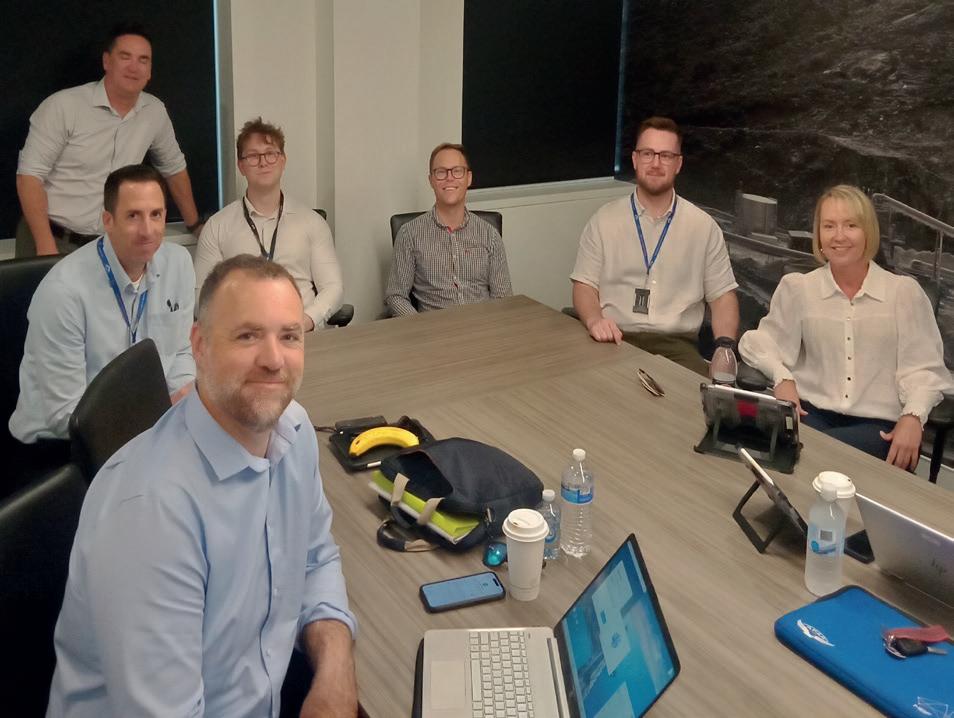
Network Aviation Pilot Council Committee Chair Capt Steve Maughan (foreground) met with other NAPC reps (from left) Capt Emmanuel Zimmerman, Capt Mark Levitt (standing), FO Josh Sheldon, Capt Ben Walmsley, FO Matt Atkinson, Capt Sasha Leavy on 2 December. Capt Geoff Aro was an apology.

The Narrow Body EA2024 was voted up with a strong majority vote in September, with 98% of pilots participating in the vote and 75% of those voting in favour of the new EA.
The response to the EA outcome has been overwhelmingly positive and with the vast majority of pilots pleased to be moving on from negotiations and looking forward to the significantly improved EA and incomes being implemented.
The EA has been approved by the Fair Work Commission and will commence from 23 December 2024. The Company has commenced paying the increased salary early and made partial backpay payments to provide pilots extra income prior to Christmas.
Key Improvements:
• 15% increase to base hourly rate on commencement, then 3% PA
• Full-Time: 34.62% increase in base salary on commencement, then 3% PA
• Part-Time 50: 39.82% increase in base salary on commencement, then 3% PA
• Part-Time 75: 36.34% increase in base salary on commencement, then 3% PA
• Training Pilot: 10% / Senior Training Captain 13% / Check & Training Captain 16% Allowance re-introduced linking allowance to base salary increases
• Fatigue Credit Protection (Operational Fatigue – work related)
• Productivity Hourly Rate reintroduced: 30.18% increase for hours above 65 in 28 days
• Roster Publish Credit Protection as a term of the EA
• 9.41% increase to tax free overnight allowances (both ranks)
• International Daily Travel Allowance top up payment for international layovers
• Loss of Licence increase of 6.1% from May 2025 – then 3% annually
One of the new concepts introduced is Fatigue Credit Protection, in which a pilot’s credits for a duty are guaranteed if a removal occurs due to operational fatigue. The AFAP has followed the concept of fatigue credits from ALPA agreements in the US. The intent is to place financial risk on an operator if a duty or other factors (for example quality of hotels) drive fatigue. A pilot removing from duty due to fatigue in these circumstances will be credited for the lost hours.
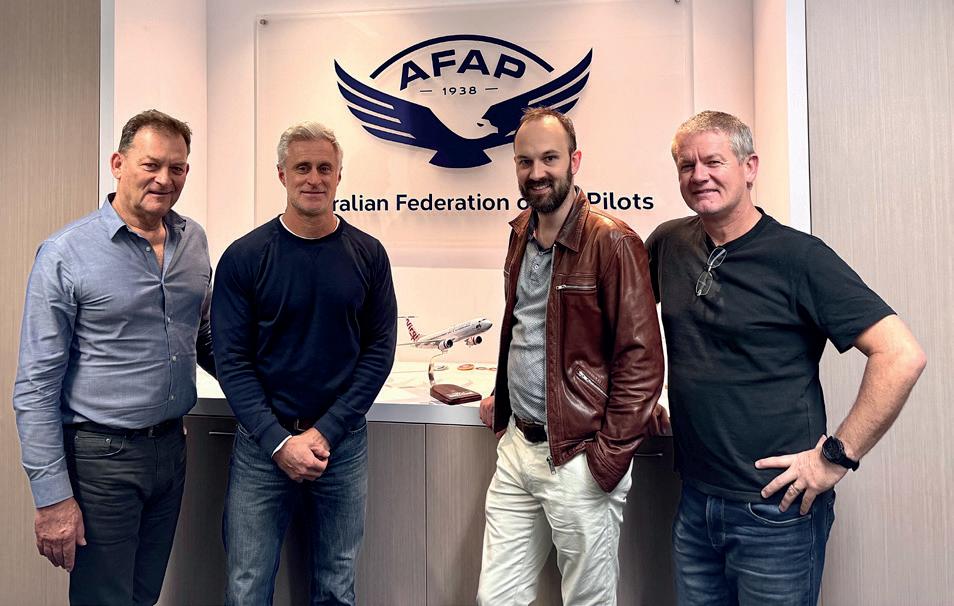
The major change to the document for the Company was a reduction in 6 days off per annum to 11 DDOs in six 28 day roster periods and 12 DDOs in seven 28 day roster periods. However, the Virgin EA retains industry leading days off even after the reduction of 6 DDOs, and hours protections around these days off (60 hours around 2 days off, with an additional 24 hours for each additional day off).
Further the AFAP used this change to return to a much higher base salary and credit threshold placing less income at risk than under EA21.
The AFAP negotiating team remained resolute during a challenging negotiation following the no vote in July, a document which the AFAP endorsed. The document post no vote was an improvement with a simpler hourly rate structure and retention of 10% minimum annual leave availability per week.
However, pilots lost several months backpay and the removal of a DTA on day trips from the first offer which will impact the earnings of pilots who perform more day trips. A tiered sign on bonus by rank will go some way to making up for lost income after the no vote.
The AFAP team will take away a multitude of learnings from the process, and ways to improve how we engage with our members. Overall, it is pleasing the pilots came together to reach a strong EA outcome and draw a line under EA21 which was agreed during administration and the pandemic.

As a member-only benefit, the AFAP offers members a special offer on the subscripton for the LogTen professional pilot logbook for iPhone, iPad, Watch, and Mac.
This is a 50% discount on the first year for new subscribers (for either LogTen Basic or LogTen Pro) and ongoing discount thereafter depending on chosen subscription.
Existing LogTen subscribers are also eligible to receive the AFAP ongoing discounted rate.
This market-leading advanced logbook offers pilots:
• Total flexibility - hundreds of options for tracking everything you need and want to track, as well as the ability to create your own filters, groups, and reports;
• Instant access to detailed analysis of your data including tracking certificates, currencies and endorsements;
• iCloud backup, instant iCloud sync between devices, digital signatures, print official logbook reports etc
Sign up now at https://coradine.com/logten4afap/
You will be asked to provide your AFAP membership number. If you need help with remembering it, contact AFAP Member Services via admin@afap.org.au
If you are already a LogTen Pro customer please contact the Coradine support team via marketing@coradine.com to ensure you are getting the ongoing discount.
Coradine can also provide support for pilots wanting to switch over to LogTen from another electronic format, their support team would be happy to help you.
One of the additional benefits of AFAP membership is access to the Union Shopper network that has partnership deal with a number of unions, including the AFAP,
The service is free for full AFAP members, and you can potentially save thousands of dollars on your everyday purchases each year. In fact, the potential savings some members make each year could easily offset their union membership fees.
Discounts are available at both retail and online stores, including supermarkets and fuel outlets which could give significant annual savings on groceries and petrol.
Union Shopper offers discounts and services across nine categories, including wine, electrical, entertainment, finance and computers in addition to restaurants and activities.
Members are also able to purchase discount gift cards from many leading retailers.
For more information and to register online, visit Union Shopper at unionshopper.com.au


At present, negotiations are ongoing for three separate enterprise agreements (EAs) with the Alliance Group throughout Australia.
In Queensland and South Australia, negotiations involve both Alliance Airlines and its wholly-owned subsidiary Bravo Airlines.
The Queensland negotiations have been on-going now for over eighteen months, and the South Australian negotiations for approximately 12 months.
By contrast, the proposed Perth EA only covers pilots employed by Alliance Airlines, and negotiations have now been underway for five months.
Unfortunately, all three negotiations are currently proceeding very poorly. That is clearly reflected by recent happenings in the Queensland negotiations.
In mid-October 2024, when the Alliance Group could not get the AFAP and TWU bargaining teams to agree on a sub-standard EA, the Alliance Group resorted regardless to putting their proposed EA out to a vote of all their Queensland pilots.
The resulting 96% ‘No’ vote for the proposed EA was emphatic. But even then, Alliance Group management still tried to pretend that they were in control of the Queensland negotiations, as well as the other two negotiations.
Given their complete refusal to admit any error in their bargaining tactics, the AFAP’s bargaining teams in Queensland, South Australia and Western Australia have recently come to the realisation that a significant change had to be made to our bargaining tactics.
As such, two separate applications to conduct a ballot for a protected industrial action (PIA) were made to the Fair Work Commission (FWC) in South Australia and in Queensland.
The two ballots took place in December and resulted in overwhelming support for all 11 proposed types of PIA.
Participation was also very high with 96% of AFAP members in Queensland and 98% of AFAP members in South Australia taking part in the ballots.
A PIA application may also become necessary soon in Western Australia. Alliance and Bravo management have taken no steps to start any negotiations for an enterprise agreement in the Northern Territory.
The AFAP and its members have not taken these decisions lightly, and have unfortunately had to realise that without this significant change in their bargaining approach, they would not be offered any substantial improvements by Alliance Group management.
At the same time that our members were applying for or voting on PIA, FWC Deputy President Lake ran a conciliation conference on 6 December.
DP Lake considered arguments put to him by the AFAP (together with the Transport Workers Union) that negotiating three separate EAs with the Alliance Group, whilst at the same time leaving Northern Territory pilots without an EA, may not be very efficient or likely to give the best outcome.
He then proposed that it would be worthwhile for the AFAP, TWU and Alliance Group management to further meet with him to see whether all parties could agree on a potentially more effective way to negotiate an EA or EAs for Alliance Group Pilots.
The AFAP considers it worthwhile to enter into these proposed discussions to try to overcome the current impasse we are encountering in all three present EA negotiations.

The AFAP continues to be a member of the Committee of Inspection (COI) to represent members’ interests. Further updates are expected from the liquidator (Hall Chadwick) in December 2024 on planned next steps.
To date members have received some of their entitlements from the government Fair Entitlements Guarantee (FEG) scheme for lost wages, annual leave, notice, and redundancy payments (important to note that the FEG applies caps to amounts paid).
Return (or partial return) of members other entitlements, such as amounts not paid due to FEG caps, superannuation, unpaid allowances or reimbursements, or the other termination payments rely on the outcomes of the liquidation process.
The AFAP has continued to follow up on Award compliance matters in CAE, noting this has drawn attention to Loss of License, accident insurances and allowance matters.
The AFAP is assisting some members with review of payment of transport and night operations allowances.
The AFAP has continued to put pressure on CAE to protect members from bonds outside the scope of the Award. We encourage members to seek guidance and advice regarding all training bonds matters.
The AFAP supported members impacted by change management at CAE, assisting in consultation, ensuring entitlements were paid to members impacted by redundant positions, and making members aware of welfare support options.

A new enterprise agreement (EA) was voted up by CareFlight fixed-wing pilots on 21 March 2024, with a 100% yes vote of all pilots who voted.
Unfortunately, CareFlight has already delayed payment of increases to the next financial year, citing the “transformative” implementation of a new payroll system.
It is disappointing that what is essentially a business process has taken precedence over the legal entitlements of CareFlight fixed-wing pilots.
The AFAP has notified CareFlight management that this is unacceptable. It was confirmed that the effect on the taxation of individual pilots had not been considered.
The AFAP is considering its options to commence proceedings over the breach of the new enterprise agreement, including seeking penalties and will consult further with the CareFlight fixed-wing pilots.
The AFAP received feedback from members previously employed at CAT about pay and conditions.
The members had identified various concerns with pay entitlements and award conditions that have not been appropriately applied during their employment. The AFAP will be working with these members to recover identified underpayments.
The pilot group advocated for their annual wage increases during July/August, resulting in a range of improvements.
However, the result still left a small number of unanswered queries on wages and entitlements.
AFAP correspondence to the company outlined a number of concerns, additions to salary, calculation of days in lieu (or day rates) and/or potential for productivity payments and has had some engagement with the company.
The AFAP and company have been exploring an agreed way forward to resolve these matters, whether by agreement or seeking third party support.
The AFAP is a member of CASA's Workplace Relations Group (WRG) committee and the Technical Consultative Committee (TCC). Enterprise Agreement (EA) commitments progressed include updating leave policies and progressing projects regarding workforce development.
CASA's WRG on 18 November reported that the policies on work hours and away from home allowances (planned travel in same location more than above 21 days) are to be consulted next.
The AFAP is pushing for the CASA methodology regarding its workforce management (technical employees, including flight operations) during the life of this EA as per the EA, by monitoring the stage projects.
Corporate Air and the AFAP have agreed to dispense with the various interlocutory matters and instead take a cooperative approach to litigation, which relates to the proper interpretation of clause 15.2 of the Air Pilots Award 2010/2020.
This approach will ‘cut to the chase’ of the issue in dispute, which is whether Corporate Air can operate under clause 15.2(b) of the Award which displaces clauses 15.4 to 15.8 of the Award.
On 24 August 2024 the Fair Work Commission (FWC) approved a new Agreement at Surveillance Australia named the Surveillance Australia Pilot and Observer Enterprise Agreement 2024-2028.
This Agreement was achieved after almost four years had elapsed since the nominal expiry of the previous 2016 enterprise agreement.
Negotiations included a protected industrial action ballot that resulted in strong support for the various actions and three conciliation conferences before the FWC.
Happily, on this occasion, in-principle agreement was achieved without the need to notify of any of the industrial actions approved in the ballot.
The Agreement provides for salary increases of 5% on 1 July 2024, 6% on 1 July 2025, 6% on 1 July 2026 and a 3% increase or CPI (whichever is greater) on 1 July 2027. The Agreement also provided for a sign on payment of 3% after its approval.
Following the nominal expiry of the agreement on 30 June 2028, salaries and allowances will continue to be increased by CPI each 1 July until a replacement agreement is approved.
Other highlights of the Agreement include significant increases to location allowances applying to Darwin and Broome bases and the inclusion of fly-in, flyout arrangements which previously sat outside the enterprise agreement.
Leidos is also the employer for pilots operating the AMSA Search and Rescue (SAR) contract. This contract provides SAR services using a fleet of Challenger 604 jet aircraft based in Cairns, Melbourne and Perth.
The current enterprise agreement expired on 1 January 2024 and negotiations for a replacement agreement are continuing.

The AFAP/Nauru Airlines pilot committee has continued to meet with Nauru management representatives.
Ongoing matters have (slowly) been aligning into potential solutions, with differences and concerns raised by both parties on various ways forward, those differences have appeared to narrow regarding award application and potential options moving forward.
Matters relating to accommodation standards continue to be an area of frustration for all parties, the AFAP has offered assistance from our Safety & Technical officers to assist to look at all short-term and to temporary changes, and consider transitional periods prior to the potential transition to new routes and pairings.
The AFAP is supporting various members with individual industrial complaints relating to their employment at Penjet, including reports of underpayments, unlawful deductions or withholding pay, issues with training bond arrangements and/or training cost matters.
The AFAP continues to work with members impacted, including as necessary pursuing matters in various jurisdictions including the Fair Work Commission and/or the Magistrates’ courts.
With the new EA having been in place for approximately five months, it has been a relatively smooth implementation, with one notable exception. RFDS Queensland (QLD) announced to pilots that during the implementation process, it had discovered anomalies in how personal leave, annual leave and long service leave was accrued and acquitted.
In light of this, RFDS QLD announced that it intended to change the methodologies it applied to how those types of leave were accrued and acquitted.
It appeared that changes to the personal leave balances were inconsistent with representations made by RFDS QLD to the AFAP during bargaining, and would result in a lesser entitlement to personal leave compared to the entitlement previously received by pilots.
The AFAP raised its concerns with RFDS QLD, which is currently reviewing the issue. We are hopeful that RFDS QLD will apply the correct method of accruing and acquitting personal leave (and any other type of leave). If not, the AFAP will look to disputing this issue in the Fair Work Commission.
Negotiations for a new section wide EA at RFDS SES are still ongoing. The AFAP and the company remain apart on two significant issues, namely Hours of Work Provisions and Shift over-run which, if not addressed satisfactorily in the proposed agreement, will likely lead to a 'no' vote.
The pilots are seeking parity with the rostering arrangements at other aeromedical operations which we maintain are critical for retaining and attracting pilots.
However, RFDS SES management is pushing back and maintaining the need for flexibility in these areas so the operation can continue to meet its contractual requirements.
If there is no consensus reached the RFDS SES will likely put an agreement out to a vote in the next few weeks that is not supported by the AFAP.
RFDS WO has been relatively quiet until recently, when it was decided that district allowances would not be payable when a pilot is on paid parental leave. This decision was made with no announcement to the pilot group.
After reviewing the terms of the enterprise agreement, and the relevant policies, the AFAP lodged a dispute with the Fair Work Commission over the non-payment of the allowance.
As soon as the dispute was lodged, the RFDS WO changed its mind and stated that the allowance would be paid, and a conference was not required to be held by the Fair Work Commission.
The RFDS WO has also commenced to roster pilots to work on public holidays, without first making a request of them to do so.
This is contrary to the decision of the Full Federal Court last year which held that a request must be made, which may or may not be refused, depending on whether the request, or the refusal of the request, to work on a public holiday is reasonable.
What is reasonable will always depend on the particular circumstances of the pilot and the request.
The AFAP has written to the RFDS WO to remind it of its obligations, and that simply rostering a pilot to work on a public holiday is not sufficient and we expect the RFDS WO to follow the correct procedure in future.
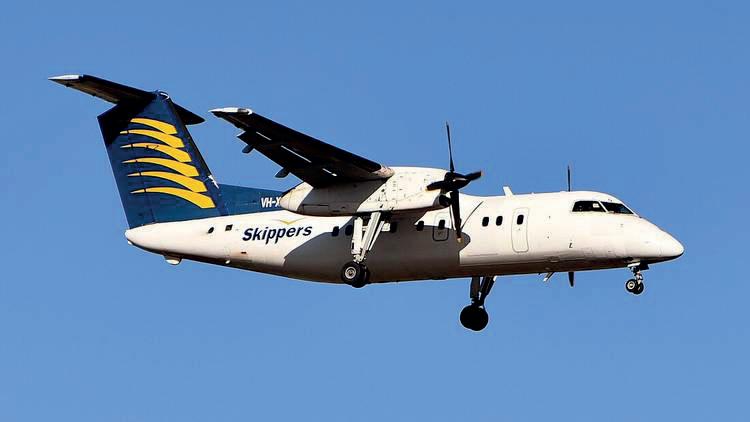
The AFAP and Skippers Aviation commenced bargaining by way of notice from the AFAP as bargaining representative for a new agreement in July 2024, noting this was overdue since the nominal expiry in 2019.
The parties have corresponded on the new agreement claims, both by meeting and written correspondence.
The AFAP's focus is to continue to work on improvements and meeting new requirements of the Fair Work Act. Skippers appears to be seeking to maintain an agreement with only minor changes, and to keep it tailored to their operations.
Bargaining has continued through the year at Skytraders for a new agreement to replace its Zombie Agreement. Several significant issues remain unagreed, including rostering and remuneration.
Notwithstanding that the AFAP has informed Skytraders in no uncertain terms that the current offer on these issues will not be accepted by the pilots, the company has decided to put out the agreement for a vote, with a closing time of 17 December 2024.
The AFAP does not support the agreement in its current form and is looking ahead to assess the options available to the pilots later in the month and early 2025.
On 6 December, the VARA 2024 Enterprise Agreement was voted down by pilots with 63% voting 'no' from 96% participation.
While the proposed EA addressed many of the AFAP claims and provided an initial 8.5% salary increase, the AFAP was unable to endorse the package as the document also reduced the hours around pilots’ days off which was a critical priority for our members to remain unchanged.
The AFAP will now work with the other bargaining representatives to determine the reasons for the 'no' vote and then look to get back in the room to resolve an agreement that VARA pilots can support.
A case run by the AFAP in the South Australian Employment Court addresses fundamental industrial relations principles that have been overlooked in the aviation industry.
In particular, the case gives important recognition to the 38-hour week in the Air Pilots Award 2020, which entitles pilots to overtime at their normal hourly rate (single time) for each hour they work beyond 38 hours.
The AFAP won the case on behalf of a member who was seeking to recover unpaid wages for performing rostered standby duties in excess of 38 hours per week.
The case establishes that employers cannot roster excessive standby without this being recognised and accounted for when determining a pilot’s salary.
It also acknowledges that standby - a core duty performed by many pilots - is work that they are entitled to be paid for under the “wage work bargain” between employers and employees.
Among other things, these findings have implications for enterprise agreements when the Fair Work Commission applies the Better Off Overall Test (BOOT).
During the trial, Corporate Air Charter Pty Limited (CAC), contended that overtime is not payable as the Air Pilots Award does not provide for payment of any overtime, that standby duties were not ‘work’ that a pilot is entitled to be paid for, and that aviation employers were allowed to average the weekly 38 hours of work over a six-month period.
None of these contentions that CAC put forward were accepted by the South Australian Court.
Disagreeing with submissions made by the company, the Court found that standby duty was indeed ‘work’ within the meaning of the Award and work that must be included in the 38 ordinary hours of work per week.
The Court held that standby was 'unambiguously identified as one of the pilot’s duties of employment under the Award' and is paid work under the Award.
The AFAP welcomed this finding as standby duty is a restriction on a pilot’s time which should not be worked for free!
This finding has wide and significant implications for the aviation industry.
The SA Employment Court also found that the 38 hours of work per week was not capable of being averaged because the Award does not specify a period for the averaging to occur over.
The Court held that hours worked more than 38 (including standby hours) are overtime hours worked by a pilot that are to be paid at the relevant pilot’s ordinary rates.
Following the significant findings of the South Australian Employment Court, the company appealed the judgment to a Full Court of the Federal Court.
The hearing of the appeal occurred on 19 and 20 November 2024, during which the AFAP vigorously defended the findings made by the South Australian Employment Court.
The Federal Court will now consider whether the South Australian Court got it right. This means that the findings in relation to standby, overtime and averaging will be considered by three Justices of the Federal Court who will determine whether these principles will stand.
Now we wait for the outcome of the appeal which, if the findings of the Court below are upheld, will drastically improve pilots’ conditions under the Air Pilots Award.
[Australian Federation of Air Pilots v Corporate Air Charter Pty Ltd [2023] SAET 63]

The South Australian Employment Court recently considered issues relating to payment of overtime and rostering under the Air Pilots Award including whether overtime was payable where pilots are rostered to perform more than 38 hours of duty per week including standby duties.
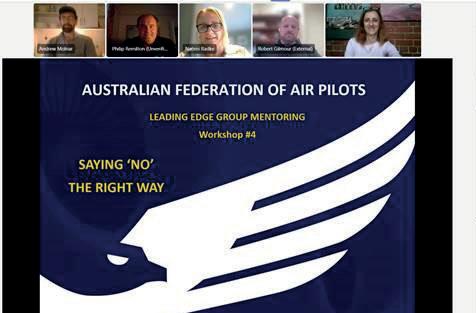
The fourth - and final - Leading Edge Workshop for 2024 was held online on 28 November. Further group mentoring workshops are planned for 2025.
AFAP's 'New Wings' program promotes and advances the interests of Australia's next generation of pilots. It seeks to ensure that pilots in the early stages of their career are effectively supported on the path to a fulfilling profession.
As part of this wider program, this year the AFAP launched a series of informative 'Leading Edge' online workshops.
These workshops covered a range of topics specifically designed for early-career pilots (from CPL to first five years) looking to develop their professional knowledge and skills.
Through this initiative, coupled with our 'Resilient Pilot' project, the participants were also able to access a team of experienced pilots available for ongoing mentoring in an informal environment.
The online workshops covered a wide range of topics including:
• Key must haves from aircraft endorsements
• Turbulence penetration awareness in GA
• Using decision-making models
• ICAO competencies
• Practical examples for every pilot to use now
• Coping with your first scare
• Saying 'no' the right way
The Leading Edge workshops are a chance for new pilots to network with each other and learn from experienced pilots from within the AFAP. The workshops are suitable for students, new CPL holders, cadet pilots and other members in the early stages of their piloting careers.
Members will be notified by email and on social media once dates for the program of workshops for 2025 are finalised.
The National Pilot Council (NPC) hosted information seminars (followed by networking) in Darwin, Kununarra and Broome in late-August.
Members and other pilots or instructors were invited to attend and participate in discussion of industrial rights in the aviation industry and to learn more about salary rates and working conditions (including rostering and other common issues for commercial pilots). AFAP Legal/Industrial Officers outlined recent and forthcoming changes to industrial relations legislation, and other critical aspects impacting employment as a professional pilot.
AFAP S&T staff gave an update on recent progress and success in the effort to improve safety standards (including in fatigue management).
Finally, we briefly described how pilots working in General Aviation (in fixed wing or rotary operations) can make use of the benefits and services we offer, including mentoring, welfare services and Loss-ofLicence cover through the AAP Mutual Benefit Fund.

Through the New Wings program, the AFAP and AAP MBF jointly fund annual scholarships to the value of $3000 for student pilots at Australian universities.
Bachelor of Aviation students Nathan Vassallo (Dux Volans 2024) and Dane Sorenson (Best Safety & Teamwork) were each awarded a scholarship at the University of NSW awards night in September.
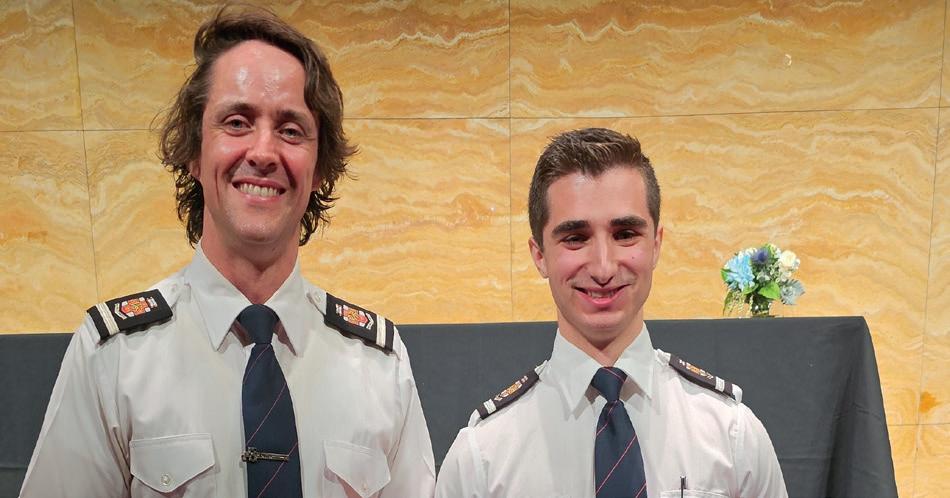
The Safety Occurrence Guide for pilots has now been published and has been used numerous times to assist our members after safety critical events. The feedback has been very positive.
Over the last year AFAP Safety & Technical (S&T) has assisted dozens of members with Safety Interview Support and Accident/Incident Emergency Hotline calls.
The S&T team ran a Safety Interview Support course at our Brisbane office in August. Several members were trained to support other members during a safety interview or review. We also assisted the delivery of Accident and Incident Training to members in Sydney and Perth.
Fatigue management
AFAP S&T has published two AusALPA position papers related to fatigue matters:
• Sick Leave & Fatigue Management
• Workload & Fatigue Management in Rotary Wing Operations
Cabin Air Quality
The Cabin Air Quality conference was held in London last month where some significant advances in less hazardous oils, filtration of bleed air to the cabin and the blood test developed by Prof Furlong (to detect organophosphte exposure) were presented.
AFAP S&T representative Anna Wakelin remains on the board of the Global Cabin Air Quality Executive. S&T Manager Marcus Diamond presented the AFAP's long history and experiences with the problem.
AFAP hosted IFALPA’s Dangerous Goods (DG) Committee meeting at AFAP’s Brisbane office in early October.
The meeting agenda focused on the increased fire risk and associated issues with mitigating or containing lithium battery thermal runaway events and the issues related to the carriage of DGs (see more in the IFALPA section on page 6).
Prioritised crew screening
A working group has been established by S&T to reinvigorate the push for more efficient and standardised screening for pilots at our airports.
So far one council has put forward several reps and we encourage a broad cross section of our membership to contribute so that we can engage as much of the industry and Government as possible.
A new Bill aims to more fairly place unused slots into the mix for others to use, and to allow recovery/ contingency situations to not be hemmed in by the existing maximum limit of movements per hour.
We support fairness of slot allocation and contingency optimisation but envisage this will not be achieved without the use of the specific contingency measures of balanced runway use (a more equal share of movements on runways) and relaxation of the current restrictions preventing some intersection departures.
If these measures are not considered and implemented, greater pressure will exist for deterioration of safety standards, procedures and practices in order to reach the intended outcomes of the Bill.
From our discussions with ATC personnel, the ability to increase movements above the current limit is impractical in nearly all situations other than for something like a temporary evacuation from the tower. Any weather related event does not cease as quickly.
The final report from the inquiry into Sydney Airport Demand Management Amendment Bill 2024 was released on 27 November.
The report found that while there has been improvement in slot use following the pandemic, under the current guidelines, there was evidence airlines utilised the slot system to maintain their existing slots and optimise schedules.
The report concluded more effective regulatory oversight is required to ensure slot allocation is fair, efficient and transparent.
The Aviation White Paper (AWP) has been released and sets out the Government’s policy agenda towards aviation related matters.
The paper has a strong focus on the wider community's needs in relation to consumer protections and the management and monitoring of aircraft noise.
The AFAP had advocated for attention to some longstanding industry issues, including related to airports, future pilot skills development, and the needs of regional Australia, amongst others.
The AWP sets out that there will be a review of the Airports Act and associated regulations and practices.
We are pleased with the inclusion of this policy intent but are underwhelmed with policy related to future pilot training.
We have advocated for an industry funded training levy in recognition of the financial impost of pilot ab-initio training upon individuals and the GA community.
While this initiative has not been included in policy, the AWP does set out an expectation that larger operators contribute more to the resource needs of their own operations.
Minister Catherine King has established an independent advisory body - Industry Skills Australia - to establish the Jobs and Skills Council for the Transport and Logistics industry sectors.
The AFAP's Capt Louise Pole sits on the Aviation Strategic Workforce Planning Committee while Capt Naomi Radke has recently joined the pilot training working group.
In summary, our S&T representatives and staff have had another productive year. We remain dedicated to advocating for and enhancing Australia's aviation system through engagement with all stakeholders.
Our critical incident support and safety interview assistance for pilots in need continues to be a valuable service for members and is now reinforced by the Resilient Pilot program.
Our ongoing participation in AusALPA and IFALPA has proven invaluable, allowing us to exert influence at all levels of aviation safety and oversight.
Expanding and nurturing our representative base from within our membership remains a key priority. We encourage members interested in getting involved to contact technical@afap.org.au
S&T Officer and Resilient Pilot (RP) mentor Capt Naomi Radke has led the AFAP's RP mentoring/moaching and professional development program into a highly regarded member benefit.
More than 50 members have been involved over the last year with many remaining engaged with the tailored mentoring/coaching and continuous development scenarios and resources.
The AFAP has an agreement with RP for a licencing and/ or joint venture arrangement with exclusive rights for the Asia-Pacific region. We expect continued growth of the program as we proceed with setting up a separate entity to be able to deliver RP externally to our region with funds generated to be fed back into AFAP.
The program has been presented to many local operators, airlines and CASA. We have demonstrated the AFAP Resilient Pilot program at PACDEFF, the Australian Aviation Psychologists Association and the Regional Aviation Association of Australia. We have also presented to Jetstar, National Jet Systems, Virgin and Cathay Pacific.
We have various organisations approaching the AFAP to discuss integration of AFAP Resilient Pilot as a supplementary service for their pilots. Currently RFDS Central Operations, Fiji ALPA and a local TAFE have shown interest. A consequence is the need for further program delivery resources.
CASA is also considering putting a few of its flight operation inspectors through the RP program in future.
For more information, contact AFAP Safety & Technical Officer Capt Naomi Radke (technical@afap.org.au).
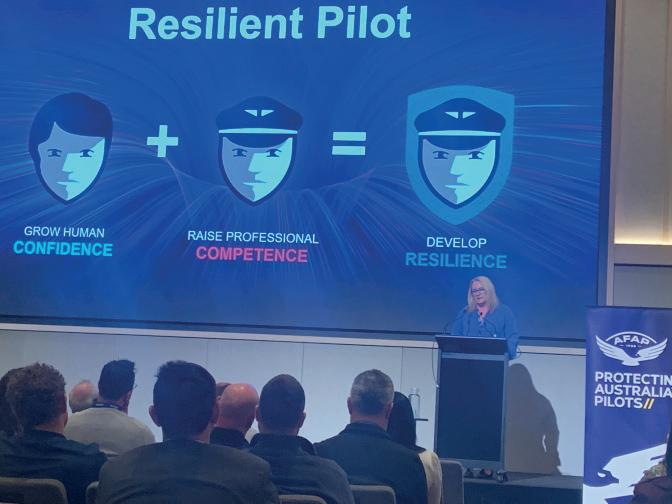
The AFAP was joined by CASA and the University of NSW as major sponsors of this year's Pacific and Australasian CRM Developers’ and Facilitators’ Forum (PACDEFF) - a unique conference held annually that focuses on crew resource management (CRM), nontechnical skills (NTS) and Aviation Human Factors.
Held in Melbourne over 29-30 October, the 2024 conference attracted more than 450 Human Factors, Aviation Psychology and Safety professionals, practitioners and academics, including AFAP Safety & Technical (S&T) pilot representatives.
During one of the afternoon break-out sessions, S&T Officer Capt Naomi Radke presented on the AFAP Resilient Pilot program to a very interested audience.
PACDEFF 2025: Sydney, 16-17 September
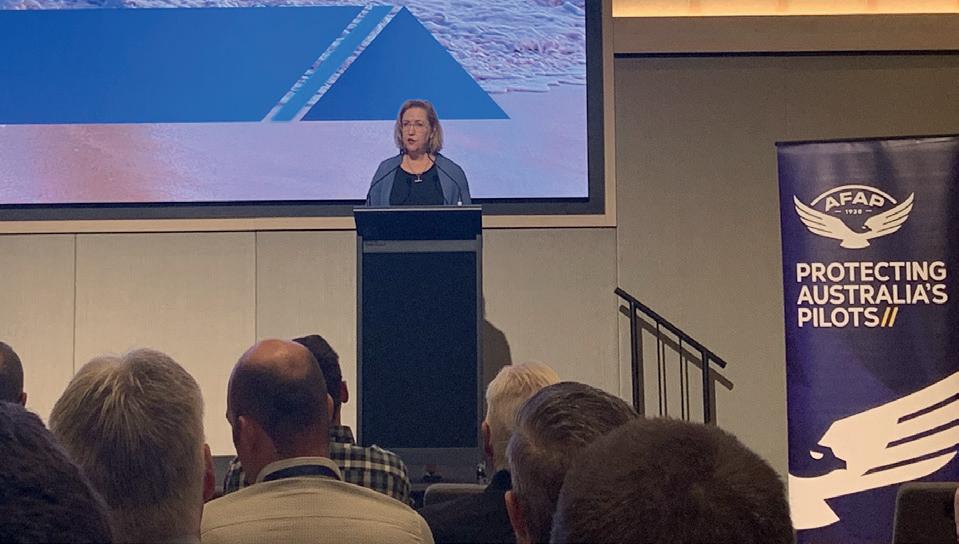


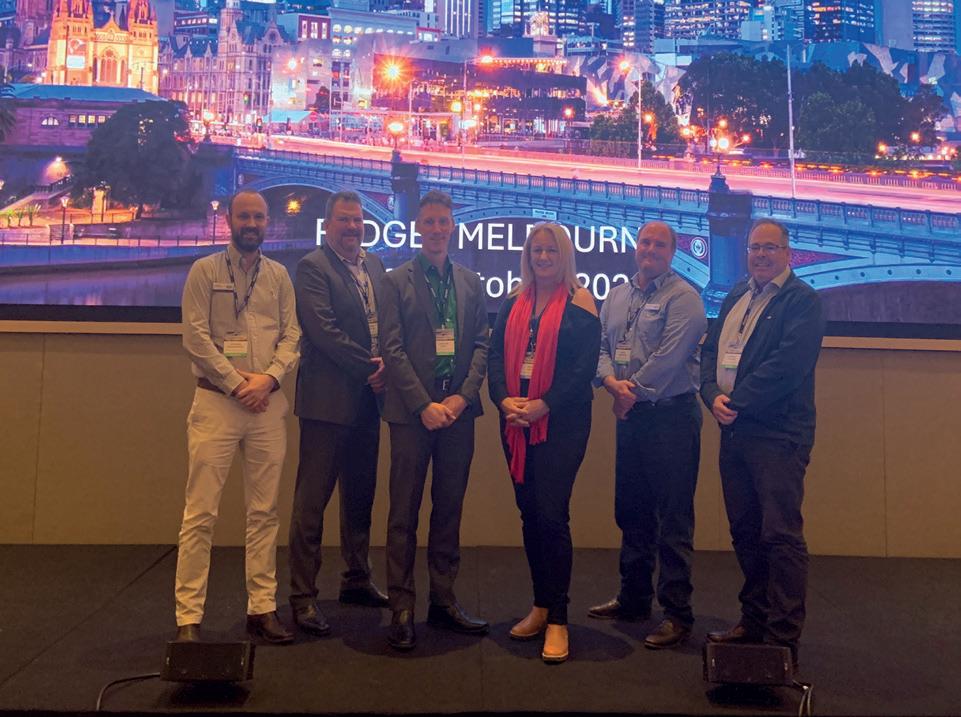
The AFAP's Safety & Technical (S&T) Committee represents and promotes the interests of Australian professional flight crew and champions the highest possible standards of aviation safety.
The S&T Committee is mainly concerned with ensuring that proper safety standards and practices exist at all levels of the aviation industry. It consists of a S&T Director, pilot representatives from the AFAP membership, and the AFAP's S&T staff.
Captain Philip Remilton is the current S&T Director and is responsible for representing the Federation on safety and technical matters affecting aircraft operations, passengers and crew.
An induction meeting for new S&T reps is planned to be held in Melbourne in April/May next year. If you are interested in becoming involved, contact the S&T Director via technical@afap.org.au.


The four National Jet Systems (NJS) Pilot Council committee members of Capt Anthony Clouting (Chair), FO Eric Galliers (Vice Chair), Capt Justin Gordon (Secretary) and Capt Paul Davison have continued their ongoing circulation of having Council meetings across all the bases. The last meeting was held in Melbourne (having delayed the Hobart meeting due to extensive 220 training in Melbourne).
By arranging a member meeting in the crew hotel at Melbourne to enable those undertaking their conversion, there was a good attendance of pilots with the main topic of discussion being the preparation for the next EA due to commence at the end of 2025.
The company's view that the current EA is not fit for purpose continues to be confusing. With massive recruitment required from mid-2025 there has been a recognition that the current EA has fallen significantly behind in terms of recruiting and retaining pilots
The NJS Pilot Council Committee formally wrote to the company seeking that a revised EA be considered which included changes to five terms and conditions of employment. Initially the company formally responded to say that the closeness of negotiations for a new EA would mean they would not address an interim increase to conditions.
This position recently and unexpectedly changed at the last NJS Council Committee meeting where the company indicated they were now reconsidering their position.
To date no further details have been forthcoming but the chopping and changing of positions is an indication that Qantas is unclear about the NJS operation and how to address recruitment and retention.
The Committee also secured a notable win in relation to delays to training that was resulting in many pilots being placed on training reserve for a significant period of time.
Normal reserve would, in line with the current EA, require the normal two hours notification for duty, but this was extended by agreement with the company to two days, to enable greater personal flexibility. The last training group for current pilots is expected to be April or May 2025.
The company recently announced its need to introduce Direct Entry Training Captains (DETCs) into the 220 fleet operation to enable the significant growth in trained 220 pilots needed to operate the new fleet.
While not ideal, the NJS Pilot Counci Committee pressed for and obtained the agreement that any DETCs would only enter on the bottom of the seniority list and only at the Melbourne base.
Subsequently the number of DETCs originally envisaged increased and slots were provided for some of them to submit an expression of interest (EOI) to undertake Canberra positions without recourse to the normal EOI process.
Subsequently the Committee lodged a consultation dispute as the EOI was not open to all as per the EA. Discussions are continuing with the company.
The last commercial B717 flight was a NJS flight that took place in October but then, due to issues with Network Aviation, was immediately provided to them deploying a B717 to operate a daily service from Perth to Paraburdoo from 6 November until the end of the month.

The last remaining QantasLink Boeing 717 in service at NJS took to the skies for the final time in October. The final commercial flight from Sydney to Canberra — QF1511 — was operated by NJS Pilot Council Committee Vice-Chair FO Eric Galliers (left) and Capt Andrew Papa

In September Qantas short haul (SH) pilots decisively (65%) voted 'no' to a proposed SH Enterprise Agreement. The AFAP did not support the deal and instead presented an alternate position that reflected our members' position.
The primary issue with the document was Qantas selling structural improvements in conditions as pay rises, when the financial benefit of these changes was not guaranteed and open to mitigation by Qantas.
Since the 'no' vote the AFAP team has held further meetings with Qantas to discuss ways to address SH pilots' concerns with the offer. While the AFAP was ready to meet immediately following the 'no' vote, Qantas delayed meeting for more than a month.
Importantly, Qantas has agreed to include the AFAP in the future EA document and review where it can provide equal representative rights to AIPA, after the document voted down did not mention the AFAP once.
Qantas has also stated that both AFAP and AIPA endorsement of an EA would be the best means to achieve a yes vote.
The AFAP agrees with this assessment, and our SH negotiators have separately reached out to AIPA’s incoming team to seek to meet and find a common position.
In the meantime, the AFAP presented a position to Qantas that would value the concessions made during covid in the variation to the SH EA (such as removal of the geographic box) that were achieved with the threat of SH pilots jobs being outsourced.
The AFAP see this as providing a potential path to a negotiated outcome as it would provide funding for additional pay rises and benefits in the EA and fit within the Qantas’ “wages policy”.
It would also provide a tangible recognition that Qantas is changing its approach to bargaining and that the threats and intimidatory tactics are in the past.
While Qantas was receptive to the idea in the negotiation room, they have since walked back from that position in writing after we requested written confirmation of their official position on this concept. This is clearly a disappointing position for Qantas to take.
Further meetings are planned in the lead up to Christmas and the AFAP team is committed to a negotiated outcome and endorsing a deal that addresses as many of our members concerns as possible.
The AFAP has held official meetings with Qantas on a fortnightly basis over the past month to commence negotiations in which we have presented our survey results and log of claims.
We have offered Qantas a clear direction to address long haul (LH) pilots’ EA concerns based directly on our extensive recent survey results.
The AFAP Qantas Pilot Council has appointed a LH EA team which provides representation across all ranks and they are supported by an active team of pilots in the background.
We have seven LH pilots in addition to the pilot representatives on the AFAP Qantas Pilot Council involved either in the room or in background roles.
Qantas has outlined its priorities for bargaining which are focused on addressing issues related to the significant training load it has coming up.
To this point Qantas has been actively engaging with the AFAP and our positions in LH bargaining.
While this has been a positive start to negotiations, we will reserve judgment on whether things have truly changed by the outcomes we can achieve in bargaining.
Following recent elections, the Qantas Pilot Council committee is made up by seven pilot representatives:
• Michael Egan Chair
• Mark Gilmour Vice-Chair
• Daniel Kobeleff Secretary
• Michael Armessen Committee Member
• Rob Close Committee Member
• Josh Chalmers Committee Member
• David LaPorte Committee Member
The AFAP has recently appointed Scheduling Officer Grace Calcagno who will be working closely with the QPC on a rostering and scheduling project that will also be expanded to the entire membership at a later stage.
QPC membership growth remains steady and the numbers of non-members receiving our communications has grown significantly. Our influence clearly outweighs our membership numbers, and the focus is on translating our influence into wins for members in bargaining. Qantas pilots interested in joining the AFAP, can contact Executive Director Simon Lutton (simon@afap.org.au),
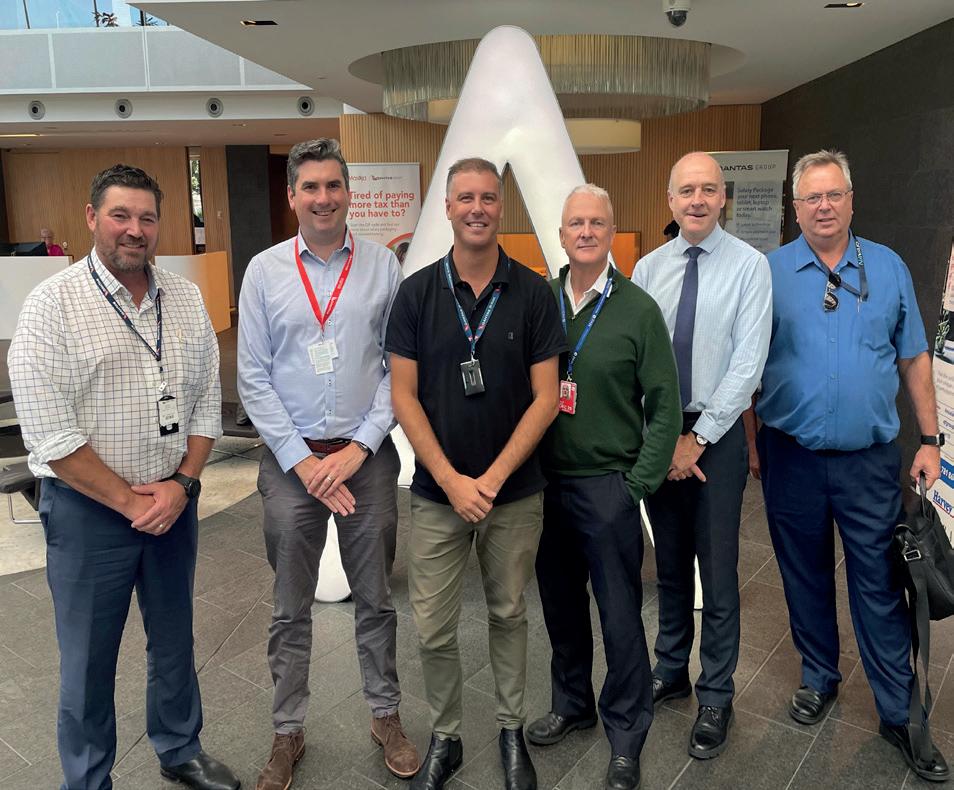
The AFAP made two formal applications to the Fair Work Commission (FWC) against Express Freighters Australia (EFA) in November.
The first was an application made under the dispute resolution procedure of the EFA Agreement regarding EFA’s refusal to top up salaries to the minimum Award rate.
The second was an application for a bargaining order over EFA’s refusal to immediately bargain and bargain jointly with all bargaining representatives, including the AFAP.
In relation to the bargaining order, after our application, EFA wrote advising it would issue a Notice of Employee Representational Rights (NERR) in the week of 16 December with a view to meeting in January.
Considering this, it became apparent there is little point in pursuing the bargaining order matter at this time and it has been discontinued (at least for now).
A survey of all union members within the EFA pilot group is underway. The AFAP’s pilot reps - FO Liam Bottomley and Capt Susha Semenikow - will meet with other pilot reps at EFA on 16 December to agree a joint set of claims to put to the company.
EFA’s external lawyers attended a conference (at the FWC on 25 November) along with representatives of Qantas Industrial Relations and EFA's Chief Pilot. At this conference the company advised its intention to further engage a barrister.
Disappointingly, it seems EFA would rather spend significant sums of money fighting our application than simply topping up the salaries to the Award level (which at this stage are relatively minor) and backdating to when the Award was last adjusted on 1 July 2024.
As EFA management maintains its refusal to top up salaries to the Award rate, this matter will now be heard on 27 February at the Fair Work Commission in Sydney.


Pilots are no strangers to long hours and time away from their families. But the job doesn’t just take a physical toll—it can also weigh heavily on personal lives, creating a unique emotional strain.
Being hundreds or even thousands of miles away can leave pilots feeling disconnected from family, missing out on significant moments, and struggling with the helplessness of not being there when loved ones need support.
Whether it's missing birthdays, school performances, or even an emergency, the emotional challenges of the job can sometimes feel just as demanding as navigating a flight.
Long stretches of time away from home, whether for domestic overnights or international flights, are part and parcel of a pilot’s lifestyle. This physical distance can lead to emotional strain and feelings of disconnection, which aren’t often discussed openly in the aviation industry.
Research, including a study titled The Impact of Work on Pilots’ Personal Relationships (Avis, Bor, and Eriksen 2004), highlights the isolation and extended periods of separation pilots often face, leading to stress, guilt, and frustration from missing family events and milestones.
One of the most significant challenges is the emotional burden of missing key moments in family life. For pilots with children, missing school events, sports activities, or milestone birthdays can lead to feelings of guilt and anxiety (Bor et al. 2010). The constant fear of missing out (FOMO) can affect a pilot’s sense of self-worth and overall job satisfaction.
Many pilots have also expressed concerns over the stress of being away during family emergencies. Whether it’s a sick relative, an injured child, or a household crisis, the inability to physically support loved ones during these moments can exacerbate feelings of helplessness.
Research from The Mental Health of Pilots: An Overview (Bor, Field & Scragg 2010) has shown that these emotional burdens can take a significant toll on a pilot’s mental well-being.
While these challenges are real, there are practical steps pilots can take to reduce emotional strain and maintain strong relationships with their families.
Thanks to the digital age, staying connected with family is easier than ever. Video calls, instant messaging, and social media platforms can help reduce the sense of isolation that many pilots feel when they’re away.
Studies, such as one published in the Journal of Aviation Psychology (Field 2011), show that pilots who engage in regular communication with their families report lower levels of emotional distress and better overall mental health.
Scheduling regular check-ins—whether it’s a nightly video call to read a bedtime story to the kids or a weekly update with a partner—can help stay involved in daily family life. Even if you’re halfway around the world, it’s possible to watch a child’s school play in real-time or share a laugh over a video chat.
Pro Tip: Use apps like WhatsApp or FaceTime to set up “family time,” where you can chat, share photos, and even participate in family activities from a distance.
A major source of stress for pilots is the feeling of helplessness during family emergencies. When something goes wrong at home, whether it’s a burst pipe or a sick child, not being physically present can intensify feelings of guilt. Establishing a reliable support network at home can help alleviate this stress.
Having family, friends, or trusted neighbours who can step in during emergencies can make all the difference. Research published in Occupational Medicine (2015) found that having a solid support network significantly reduces emotional distress, especially for those in highrisk professions like aviation.
Pro Tip: Ensure your emergency support system is well-versed in your family’s needs and can contact you quickly.
While it’s impossible to predict every emergency, creating a family contingency plan can offer peace of mind. Set up clear communication protocols for when things go wrong. This might include having a list of contacts to call during emergencies or a plan for how to return home quickly if needed.
Pilots should also discuss with their airline or employer the possibility of rapid return during critical situations.
According to research in The International Journal of Aviation Psychology (Scragg et al. 2008), pilots who have clear contingency plans in place tend to experience less emotional distress because they know there’s a path to getting home if the situation escalates.
Pro Tip: Set up a group chat or email list for your family and key contacts, so you’re kept in the loop on emergencies back home.
Managing the emotional toll of being away from home is as much about looking after mental health as it is about managing logistics.
Pilots often face high levels of stress due to irregular schedules, fatigue, and long working hours. Prioritising self-care through mindfulness, exercise, or professional counselling can help cope with the stresses of the job.
Research in Aviation, Space, and Environmental Medicine (Field & Bor 2008) has shown pilots who practice regular self-care and stress management are better equipped to handle the emotional challenges of their careers.
Techniques like mindfulness exercises or deep breathing can help reduce anxiety and improve emotional regulation, making it easier to navigate both work and family life.
Pro Tip: Take a few minutes before or after the day's duty or before you leave or arrive at the hotel to practice mindfulness to reset your emotional state and reduce stress.
Being a pilot is both a rewarding and emotionally demanding career. The job requires significant sacrifices, particularly when it comes to family time and personal milestones.
However, with the right strategies, pilots can manage the emotional toll of being away from home, maintain strong relationships with loved ones, and still have a fulfilling career.
By staying connected through technology, building a solid support system, creating contingency plans, and prioritising mental health, pilots can navigate the challenges of long-distance relationships and unexpected emergencies.
As research shows, proactive steps to address emotional strain can make all the difference in maintaining wellbeing—both in the cockpit and at home.
Regular Communication: Schedule regular check-ins with family through video calls or messages to stay involved in everyday moments.
Emergency Plans: Build a reliable support network at home and establish a clear plan for responding to family crises.
Self-Care Routine: Dedicate time to mindfulness or stress management practices to stay grounded and emotionally resilient.
Mental Health Awareness: Recognise when emotional strain is overwhelming and seek professional support if needed via the AFAP's Member Assistance Program
By focusing on these strategies, pilots can reduce emotional distress, stay connected with their families, and continue to thrive in their careers and personal lives.



The Rex Group remains in Voluntary Administration –and the period of voluntary administration has now been extended a second time, with the convening period now extended to 30 June 2025.
The extension of Voluntary Administration is – for now – a positive, as it allows the regional airline business to continue operating more or less as normal, while the Administrators prepare the business for sale.
Reading between the lines, it seems that the airline business as it stood in July, and even in November, has not proven sufficiently attractive to secure a buyer so far – but we are assured that it is still the intention of the Administrators to achieve a sale.
In October, Toll Group acquired Pel-Air's fixed wing air ambulance services currently under 10 year contract terms with the NSW and Victorian governments.
The administrators are still working on selling both Rex’s head office building in Mascot and the campus of the Australian Airline Pilot Academy (a wholly-owned subsidiary) in Wagga Wagga.
Safety & Technical
Further, we understand that the reason Rex Airlines Pty Ltd (the B737 operation) has not yet been liquidated, despite having no chance of resuming trading, is that the company owns a number of assets (such as B737 parts) for which a better return is expected if they are free to take longer to sell them.
Fortunately, despite the administration period being extended once again, the relevant Federal Minister has used their discretion to approve an immediate payout of former RAL employees’ entitlements, under the Fair Entitlements Guarantee, so former employees will not be left waiting until mid next year to access their Government-guaranteed entitlements.
The Administrators have also secured an $80M “loan facility” from the Federal Government, which they say they intend to use to get more aircraft back in the air (i.e. new engines installed on currently-grounded aircraft) to improve schedule integrity.
They also intend to conduct an optimisation of the route network and flying schedule, as well as preparing “detailed modelling of a fleet renewal program”.
For the first time since Rex entered Voluntary Administration, the Administrators have indicated that they intend for the airline to resume hiring pilots and flight attendants.
A handful of pilots (both former Saab captains made redundant from the 737, and a few cadetship graduates) have recently started ground schools.
There have also reportedly been recent interviews with pilot candidates, which supports that Rex does intend to resume hiring pilots.
In summary, the process of voluntary administration remains relatively painless for ongoing employees, but there remain months of uncertainty ahead as we wait to see whether the administrators will be successful in finding a buyer for Rex’s regional airline operation.
It is with some concern that we note that – in the event that those efforts are ultimately unsuccessful, any shutdown of Rex will now only occur after next year’s federal election.
This timing would (presumably) make it much more politically acceptable for the government to allow Rex to collapse than if it had happened now or in the next few months.


2024 marked another year of substantial growth at Jetstar, with 205 new pilots recruited — 20% from the Qantas Academy and 80% from external sources.
For 2025, Jetstar projects the recruitment of 75 pilots, although this may increase as the fleet plan for NS25 is still being finalised. Since resuming post-COVID operations, more than 400 pilots have joined the airline.
However, recruitment has recently slowed in line with broader industry trends, with new applicants now placed on hold.
In terms of promotional opportunities, Jetstar has recently advertised 21 narrow-body vacancies, including 11 Command and 10 First Officer positions.
Additionally, wide-body base transfer opportunities have been offered to better align resources to upcoming schedule adjustments, including:
• Launch of the BNE-BKK service starting 13 December
• Conclusion of MEL-HNL service on 30 April 2025.
• Increased SYD-ICN services to daily from 17 June 2025.
It feels like the calm before the storm on the industrial front at Jetstar, as anticipation builds towards preparing for EA negotiations early next year.
The Jetstar Pilot Federation (JPF) has watched with interest the recent bargaining outcome at Virgin, and is closely monitoring developments at Qantas Short Haul and to a lesser extent the the Network Aviation IBD decision, which could influence Jetstar’s negotiations.
The JPF has recently turned its attention to developing an EA survey which we expect will be released to members in February/March next year, with formal negotiations to commence in May, being six months prior to the nominal expiry date.
As always the survey responses will shape the priorities and direction of the AFAP in bargaining, although we are already acutely aware that key items to be addressed will be remuneration and enhanced lifestyle protections and control.
Meanwhile, as Jetstar pilots face increased overnights and are now spending more time in hotels than ever, the standard of crew hotels has recently been at the forefront of discussions between the AFAP PCC reps and Jetstar.
The Request For Proposal for new crew hotels across key destinations like Brisbane. Denpasar, Phuket, Saigon and Seoul has highlighted the importance of clear protocols that govern the hotel inspection process.
The PCC has pushed for desktop audits of shortlisted hotels, ensuring only viable options reach the inspection stage and time and resources are not wasted on reps inspecting crew hotels that are clearly unsuitable.
Jetstar management has been receptive to this approach and we expect a much more collaborative approach to selecting crew hotels in the future.
The JBid and Rostering Working Group, formed to address pilot concerns about rostering and bidding, has yet to achieve meaningful improvements despite efforts from all parties. It is expected to be disbanded before next year’s EA negotiations, with pilots likely to direct their frustrations to the bargaining table.
The JPF is already in discussions with Jetstar regarding components of a functional trip swap system. The proposed system aims to provide pilots with maximum flexibility to swap or offload rostered duties, without undermining the industry-leading Work Day Off (WDO) payment system.

AFAP membership offers the exclusive opportunity to apply for membership in the Australian Air Pilots Mutual Benefit Fund (MBF), which provides loss of licence protection for pilots who fail their Australian Class 1 Medical Standard.
The MBF, established in 1961, is a mutual fund where profits are reinvested for the benefit of members, rather than being paid out as dividends.
• Temporary Loss of Class 1 Medical Certificate: Monthly Benefits up to $12,000, capped at one twelfth of the Member’s annual gross income (or $8,000 for unemployed Members).
• Permanent Loss of Class 1 Medical Certificate: Capital Benefit up to $800,000 (made up of nominated Standard Capital Benefit cover amount plus Premium Capital Benefit if applicable).
• Death Benefit Cover: Beneficiaries can receive up to $1.1 million in total benefits when including the maximum capital benefit.
• Refund of Contributions (ROC): Available after 20 years of continuous membership, with a maximum refund of $70,000.
NOTE: In accordance with the Rules, there are specified conditions that are limited or excluded from benefits.
Eligibility requirements to join the MBF include:
• Be less than 50 years of age
• Be a financial member of the AFAP
• Hold a current Australian Class 1 Medical Certificate
• Hold a commercial pilot licence or higher
• Derive their principal source of income from piloting activities
• Be an Australian Citizen, or a Resident in Australia
In response to Members feedback, the MBF is reviewing our Loss of Licence product. Subject to actuarial reports, medical advice and member votes, the proposed changes are:
• Cover increase up to a maximum of $1.2m
• Capital Benefit plus the Death Benefit cover of up to $300,000
• Joining age increase to 55 years
• Monthly Benefits increase up to $15,000, capped at one twelfth of the Member’s annual gross income for employed & $10,000 for unemployed members
• Introduction of Trauma Cover subject to meeting specified conditions
• Introduction of an additional Benefit for a single pilot training Benefit for an as or with a co-pilot restriction
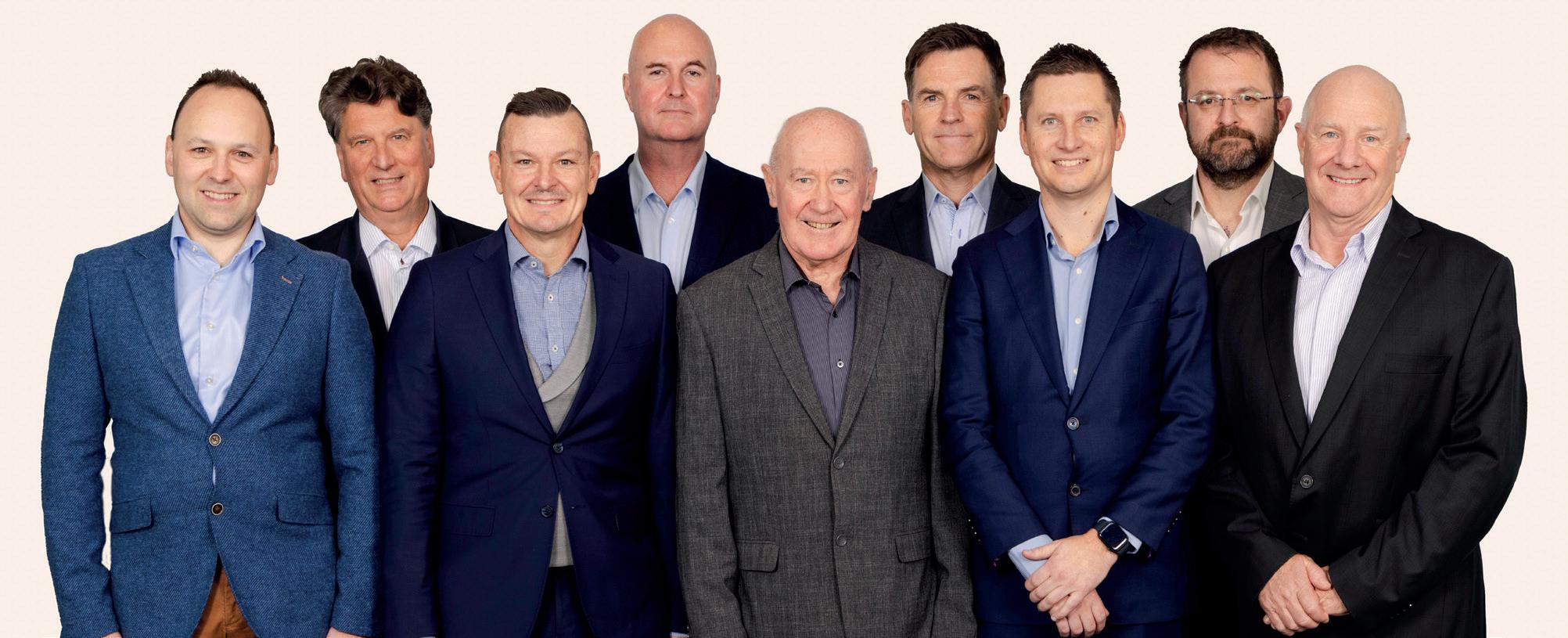
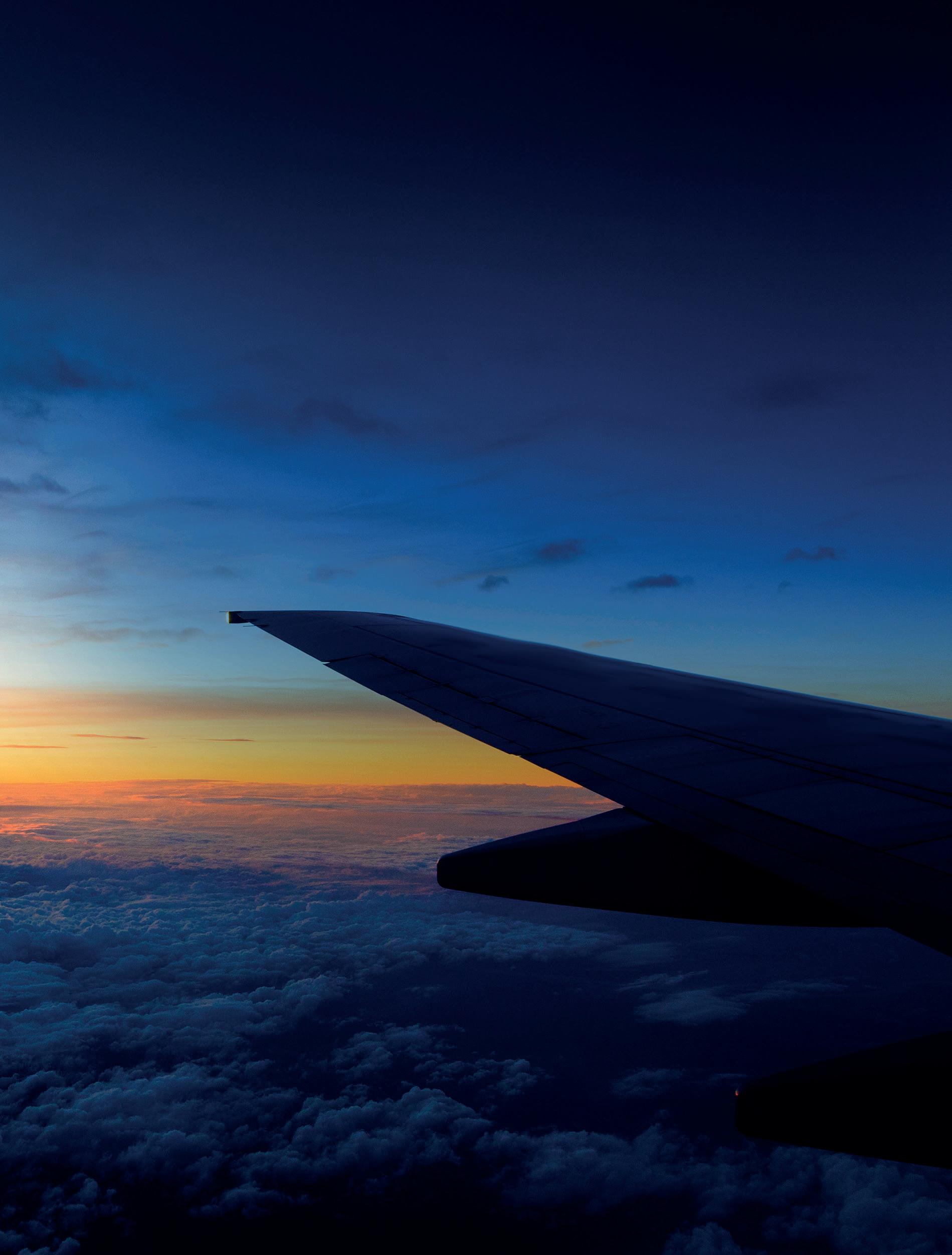
I commenced my initial training in Bendigo, Victoria in 2008. After completing my CPL and Instructor Rating, I initially instructed in Wagga Wagga. In 2012, I moved to Cairns for a full-time role at North Queensland Aero Club. I stayed with the club until 2014 where I completed a Grade 1 Instructor Rating.
Seeking to broaden my horizons I made the move into charter flying in the Torres Strait. I managed to obtain my first airline position with Jetstar New Zealand Regional in 2015 as a First Officer. In 2017, I moved to Virgin Australian on the B777 as a Second Officer, before making a move to Qantas in 2018. I underwent promotional training to First Officer in 2019 and currently fly the B737.
My health was good prior to my diagnosed medical condition. I exercised regularly and was active outdoors.
I presented asymptomatic at my aviation medical in late 2022. Upon routine testing my DAME identified a faint Heart Murmur. Further testing revealed that I had a malfunctioning heart valve which required repair.
I was immediately grounded pending urgent surgery. Surgery took place in December 2022, seven weeks after initial diagnosis. Given the nature
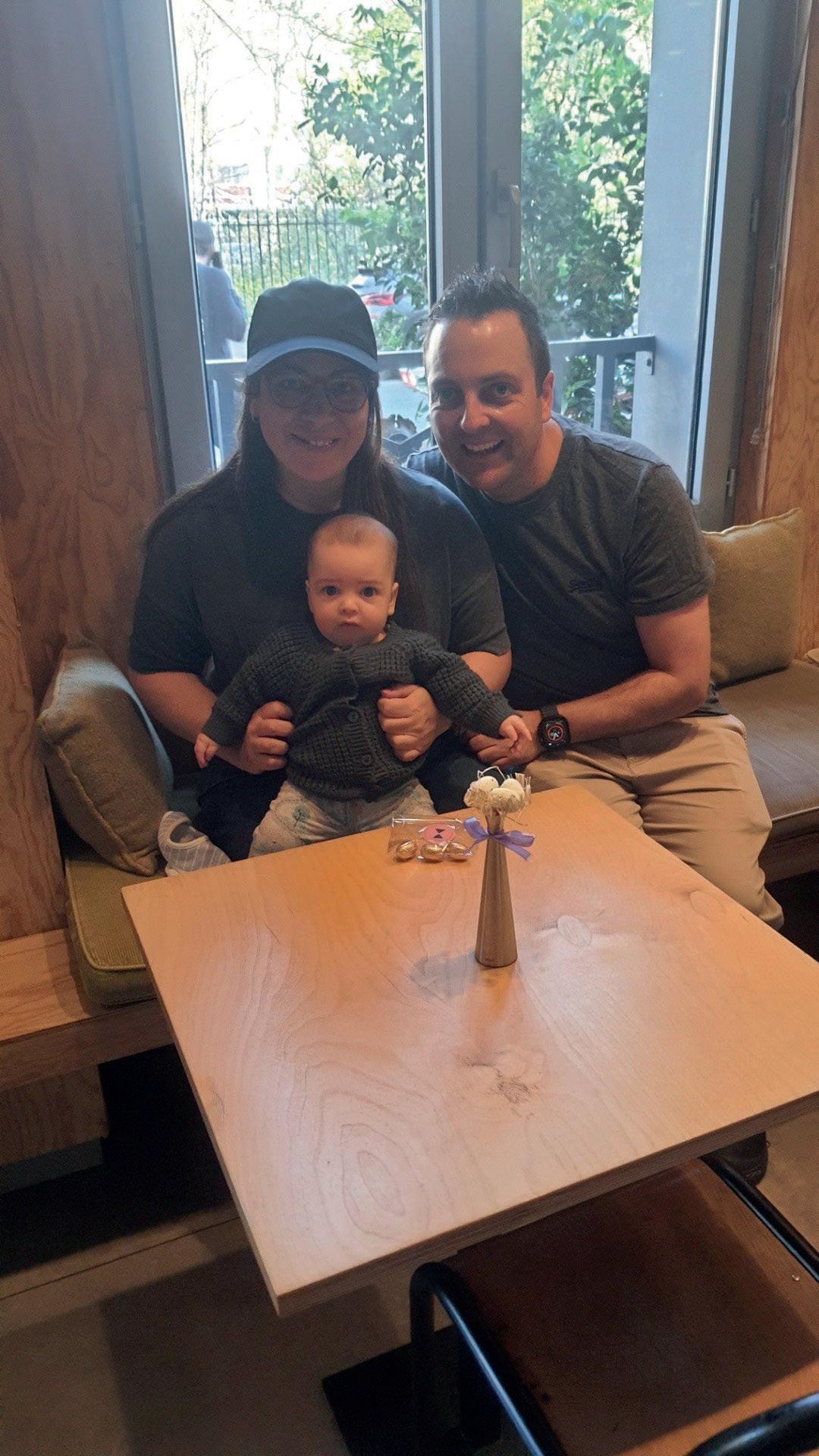
of my condition and the surgery, I was grounded for a minimum of six months post-surgery. Following this period, I was required to complete a full Class 1 medical with additional testing requirements.
How was the MBF able to help?
My experience with the MBF team was above reproach. My initial consultations with Christine and later Michelle and Linda, were a seamless process. The paperwork and medical documentation gathering, while a formality, was met with genuine care and a guiding hand by the MBF team. My wife and I had welcomed our baby boy into the world a week after my diagnosis and felt assured that we would have financial stability given the support of the MBF team.
The MBF Loss of Licence cover was instrumental in providing financial stability and surety for my family. Given the timing of my medical diagnosis, the MBF cover provided piece of mind during what was an uncertain and stressful period.


If you could not fly due to an unexpected injury or illness, have you considered the financial impact on you and your family?
Membership of the Fund can assist with eligible claims so you can focus on your recovery and less on the financial pressures of life.
A membership organization - not an insurance company
60+ years security, peace of mind and stability
Refund of Contributions to qualifying members
A ‘pilots for pilots’ mutual fund where the assets belong to members
Guided by fairness, not profit
Under the Air Pilots Award 2020, pilots are entitled to an Annual Loss of Licence allowance paid by their employer. Those with an Enterprise Agreement or individual contract may be entitled to more. Your Loss of Licence allowance may cover your entire membership Contribution.
